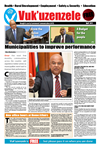Apr 2015
Apr 2015 Estelle GreeffAvailable in all languages
Municipalities to improve performance
Municipalities to improve performance Estelle GreeffOver the next few months, communities across the country will experience better service as municipalities work hard to improve their performance.
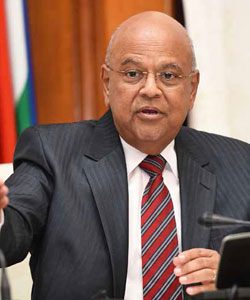 Corporate Governance and Traditional Affairs (Cogta) Minister Pravin Gordhan announced that his department would intensify the monitoring of municipalities to ensure that they get the support they need to be able to provide proper service delivery.
Corporate Governance and Traditional Affairs (Cogta) Minister Pravin Gordhan announced that his department would intensify the monitoring of municipalities to ensure that they get the support they need to be able to provide proper service delivery.
“Currently we have about 170 municipalities that send us monthly reports on what they are doing in relation to the Back to Basics programme.
“Over the next few months, all of our municipalities will start complying,” said Minister Gordhan.
He was speaking at the Presidential Coordinating Council (PCC) chaired by President Jacob Zuma at the Union Buildings.
The Back to Basics programme was launched in September last year to revitalise municipalities to ensure that they deliver basic services to South Africans.
“We were able to indicate the progress that we have made, undertaking further analysis of municipalities in South Africa… [to see] where there are crises and how we are dealing with them,” said Minister Gordhan.
He added that municipalities need to ensure that they continue to deliver basic services such as water, sanitation, housing and refuse collection.
“The PCC accepted the way forward and agreed that the Back to Basics mechanism is an important vehicle for the implementation of the National Development Plan.”
The Minister said MECs in the provinces would need to work harder to communicate with communities affected by certain issues and move quickly to resolve and find solutions whenever there are challenges in municipalities.
He added that MECs must develop stronger monitoring capacity within their provinces to put local government on stronger footing. Minister Gordhan said Cogta had submitted recommendations to the Municipal Demarcation Board to review financially unviable municipalities.
He said the board would also delimit municipal areas into wards.
“Over a period of five years, you get an inflow and outflow of people so population numbers change, and they have to take that into account during the delimitation process.”
The NDP, provincial and municipal plans
The Minister said the PCC also received a report from the Department of Performance, Monitoring and Evaluation (DPME) that looks at the plans of provinces and municipalities with regards to the National Development Plan (NDP).
“Municipalities have Integrated Development Plans (IDPs) into which plans of the Back to Basics programme will be integrated, and that will be a vehicle for the implementation of the NDP within municipalities.”
IDPs are five-year plans put together by local government to map out the future and determine the development needs of the municipality.
He said the Minister in The Presidency for Planning, Monitoring and Evaluation, Jeff Radebe, and his team would look at the plans of all provinces, national departments and provincial departments.
He said Minister Radebe’s review showed that many provinces were beginning to move in the right direction with regards to supporting what government aims to achieve through the NDP and the Medium Term Strategic Framework.
Calls to fire incompetent staff
Minister Gordhan has issued an instruction to municipalities to expel all senior municipal managers who are unqualified and incompetent.
“We are asking provinces to act on them [municipal managers] and make sure that people who occupy these types of positions are dismissed from those posts and the right kind of people are actually appointed.
“Hire the right people, make sure you have the right managers in the right places that have the right technical competence and management capabilities to manage those key areas,” said the Minister.
“Everyone, including the Premiers, have committed themselves to ensure that government becomes responsive, and that the frontline staff in government agencies becomes more citizen friendly and more forthcoming in terms of providing good services to citizens,” he added.
New office hours at Home Affairs
New office hours at Home Affairs Estelle GreeffThe new office hours introduced by the Department of Home Affairs (DHA) will improve services to the public.
The new opening and closing hours, which started last month, start from 7:30am to 4:30pm, including a 30-minute lunch break. However, opening and closing hours for serving clients will be from 8am to 4pm.
Home Affairs Director-General, Mkuseli Apleni, said the DHA consulted with organised labour before making the decision to change the hours.
There are now two shifts, the first starts at 7:30am and ends at 4pm. The second shift starts at 9am and ends at 4:30pm. Both shifts include a 30-minute lunch break.
Apleni said the new opening and closing hours would benefit the department’s clients, managers, staff members and the organisation as a whole.
“Importantly, the new opening and closing hours will afford managers and staff sufficient time to interact with each other on service delivery matters and front office operations,” he said.
Apleni said with the new opening and closing hours, staff members still work a 40-hour week spread over six days, Monday to Saturday, and work only two Saturdays a month.
Staff members on the 7:30am to 4pm shift work a 40-hour week from Monday to Friday. Those on the 9am to 4:30pm shift work 35 hours from Monday to Friday and five hours on a Saturday.
The Saturday shift starts at 8am and ends at 1pm for staff members, and from 8:30am to 12:30pm for service to members of the public.
Apleni said staff members alternate between the two shifts, so that there can be some flexibility with regard to the Saturday shift.
For more information call the DHA hotline on 0800 60 11 90.
Budget 2015: A tough balancing act
Budget 2015: A tough balancing act Estelle GreeffBudget 2015
Despite the weak global economic conditions, and the country’s strained resources, the 2015 Budget still managed to show Government’s commitment to improving the lives of the poor.
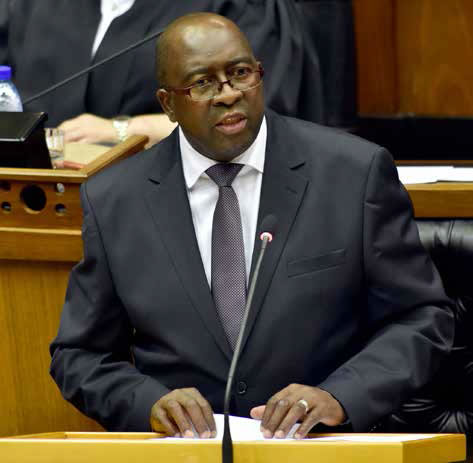 Like many other countries, South Africa, since 2009 has shown low economic growth and an increased government debt.
Like many other countries, South Africa, since 2009 has shown low economic growth and an increased government debt.
The 2015 Budget announcement was there-fore a tough balancing act for Finance Minister Nhlanhla Nene.
The good news in the Budget is that it will bring relief for low-to-middle income earn-ers with regard to income tax; increase social grants, which provide support to vulnerable citizens in our communities and more money will be spent on education and health.
New Growth Path
Coupled with rising debt, the Minister’s budget needed to set the country on a path of growth by addressing challenges that slow growth – like the energy crisis – create work opportunities and broaden economic participation.
The Minister knew he had a task of cutting expenditure over the next two years, and he had to raise revenue (income) from taxes to raise an extra R12 billion in revenue (income) to help fund the budget for this year and another R15 billion for next year.
He also needed to narrow the budget deficitto 3.6 per cent.
This was to be the most important budget in 21 years, and despite these challenges, the Minister needed to ensure that this year’s budget is in-line with the goals of the National Development Plan (NDP).
“The 2015 budget is aimed at rebalancing fiscal policy to give geater impetus toinvestment, to support enterprise develop-ment, to promote agriculture and industryand to make our cities engines of growth,” the Minister said in his speech.
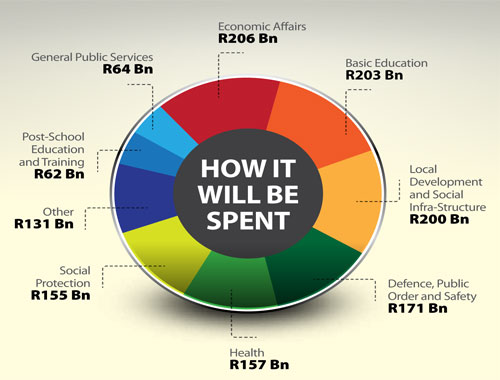 Employment & enterprise development
Employment & enterprise development
Government continues to prioritise finding ways to create jobs for South Africans.
“These include tax incentives for employment and investment, support for enterprise development, skills development and employment programmes,” said the Minister.
The following will be allocated over the MTEF period:
- R10.2 billion allocated to manufacturing development incentives and support for growing service industries.
- R5.4 billion to the manufacturing competitiveness enhancement programme to assist 1 450 companies with financial support to upgrade facilities and skills development.
- R3.5 billion allocated to special economic zones for infrastructure development. • R3.5 billion allocated to the Department of Small Business for mentoring and training support to small businesses
- R4 billion allocated to The Jobs Fund in partnership with the private sector on projects that create new employment, support work-seekers and address structural constraints to more inclusive growth.
- R11.8 billion allocated to the Department of Environmental Affairs to fund more than 107 000 full time equivalent jobs and 224 000 work opportunities through environmental EPWP programmes.
- R590 million allocated to the Green Fund over the medium term, for strategic environmental projects in partnership with the private sector.
Budget boost for municipalities
Budget boost for municipalities Estelle GreeffBudget 2015
KwaZulu-Natal MEC for Cooperative Governance and Traditional Affairs, Nomusa Dube-Ncube, has welcomed the increased infrastructure budget allocations for municipalities, a significant share of which will go to KwaZulu-Natal.
“We have long called for increased allocations for basic services in our local municipalities, which despite major advancements, continue to experience infrastructure backlogs,” said MEC Dube-Ncube.
Tabling this year’s Budget recently, Finance Minister Nhlanhla Nene announced that allocations for water, sanitation and electricity in rural municipalities had been increased substantially.
He said that R4,3 billion would be spent over the next three years to build capacity and strengthen systems for financial management and infrastructure delivery.
Review of infrastructure grants
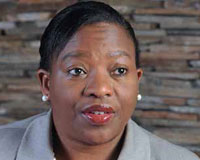 MEC Dube-Ncube said she was also excited about the planned review of local government infrastructure grants, which would lead to the consolidation of this crucial funding for development in the previously disadvantaged parts of KwaZulu-Natal.
MEC Dube-Ncube said she was also excited about the planned review of local government infrastructure grants, which would lead to the consolidation of this crucial funding for development in the previously disadvantaged parts of KwaZulu-Natal.
The review of local government infrastructure grants would focus on the maintenance of infrastructure.
“Repairs and maintenance of municipal infrastructure remains one of our key priorities as we urge municipalities to go back to basics as part of the Back to Basics programme, which we have just launched in the province,” said MEC Dube-Ncube.
Health budget welcomed
Meanwhile, the South African Medical Association Trade Union (SAMATU) welcomed the budget increase in health and education spending, saying both sectors were essential for the creation of a functioning health care system in South Africa.
The union’s president, Dr Phophi Ramathuba, said she hoped that the increase in spending would result in a great improvement on the quality of health care at medical facilities.
“Ordinary people are still complaining about shortages of medicine, medical equipment and health care professionals. We therefore call upon the Department of Health and National Treasury to find solutions,” said Dr Ramathuba.
The South African Medical Association Trade Union also welcomed the R1,5 billion that has been taken from provinces and allocated to the National Institute for Communicable Diseases, and the final commitment on the release of the White Paper on National Health Insurance.
Building a South Africa of our hopes
Building a South Africa of our hopes Estelle Greeff
The money to move South Africa forward and speed up the improvement of our quality of life is in the bank.
Every year, April is the month in which government starts to spend the Budget that the Minister of Finance shares with the nation shortly after the State of the Nation Address in February.
On February 25, Finance Minister Nene presented the Budget for 2015/16 to Parliament.
With our national Budget, government puts its money where its mouth is.
Thanks to millions of South Africans who do their duty as citizens and pay their taxes, South Africa is becoming a better place in which to live, to do business or to visit.
The money that goes into government’s coffers finds its way into our lives, homes and communities through our Programme of Action which, between 2015 and 2019, is aiming to change South Africa for the better at a rate that is much higher than we experienced in the first 20 Years of Freedom.
The Budget for 2015/16 shows that our concern for the poorest and most vulnerable people in our society is at the heart of our Programme of Action.
We are a government that cares – and that is putting its cash behind its care.
The Budget shows we are a pro-poor government that understands the circumstances and needs of those who need the support of government and society the most.
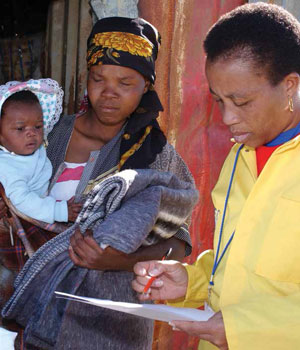 We are determined to win the fight against poverty, unemployment and inequality and our plans for 2015/16 show that we have the will and the means to wage - and win - this war.
We are determined to win the fight against poverty, unemployment and inequality and our plans for 2015/16 show that we have the will and the means to wage - and win - this war.
Believing that education is our nation’s path out of underdevelopment, more than R640 billion will be allocated to basic education during the next three years.
The number of qualified teachers entering the public service is expected to increase from 8 227 in 2012/13 to 10 200 in 2017/18.
To support teacher training, R3.1 billion will be awarded in Funza Lushaka bursaries over the next three years.
We will print and distribute 170 million workbooks at 23 562 public schools during the same period. Each learner in Grades R to 9 will receive two books per subject each year in numeracy, mathematics, literacy, language and life skills.
R7.4 billion will be used to replace more than 500 unsafe or poorly constructed schools, and attend to water, sanitation and electricity needs.
The budget also includes R4.1 billion over the MTEF period to build and support public libraries. School and community sport programmes and sports academies will receive R1.7 billion via our provinces.
Better learning conditions will produce more dignified, educated and productive citizens for our future. What this means is that our learners, their parents and their teachers have a great deal to look forward to – but also a great deal to look after.
As citizens of this special country, we should play our part to ensure that facilities such as schools are treasured and protected assets in our communities.
We should all be saddened and angered when other amenities in our neighbourhoods. These facilities are put up by government but belong to the people, and should be treated as such.
When, for any reason, anyone sets a classroom alight or breaks a window, they are not just damaging infrastructure for which South Africans are paying with their hard-earned income. They are damaging lives and the prospects of our nation developing as fast as it could.
Another big slice of our Budget and our vision is going into the nation’s health.
Health spending will reach R178 billion in 2017/18.
Based on increases in health spending in the past 20 years, South Africans are living longer and healthier lives today than just five or 10 years ago; not even a generation ago.
Our antiretroviral treatment programme now reaches 3 million patients. The mother-to-child transmission of HIV has decreased from 20 per cent a decade ago to 2 per cent last year, and is expected to decline further over the period ahead.
Government is playing its part. But, if we are to maintain a healthy nation, it is up to everyone among us to make healthy and wholesome lifestyle choices – from what we eat and drink to what we do with our bodies.
A great deal of our nation’s health problems can be eliminated if we were just to make better choices. Eating balanced and wholesome meals, avoiding the abuse of alcohol, staying away from smoking, keeping our cigarettes away from our children and being responsible in our intimate relationships can change the burden of disease – and the burden of the money to pay for this burden.
To help the poorest households in our society, the Department of Social Development is being given an additional R7.1 billion to make it possible for more needy South Africans to receive social grants, and for the value of grants to be increased.
With this in mind, the Minister of Finance announced that monthly grants will be adjusted as follows from 1 April:
- The old age, war veterans, disability and care dependency grants will increase by R60 to R1 410.
- Child support grants increase to R330.
- Foster care grants increase by R30 to R860.
It is the responsibility of all grant recipients – especially those who care for young children – to ensure that the money is used in the right way. With the grants government is providing, there is no reason why children should not be fed or clothed, or have safe and comfortable places – at home or elsewhere – where they are cared for.
Children who should be at school, must be at school. They should not be at home, loitering, begging or fearing abuse from adults who prey on vulnerable children.
A better life for all starts in these small ways and it is our responsibility as parents, caregivers and communities to ensure that our children are and feel safe.
To further improve the quality of life and our level of development, government will be spending hundreds of billions of rand in the next three years on upgrading roads, putting new trains on our railway tracks, bringing water and sanitation to residents and connecting 875 000 households to the electricity grid or to get off-grid power.
However, government will not only be giving. It will also be taking, especially from those who indulge or particularly over-indulge in alcoholic beverages and tobacco products.
The abuse of these substances creates enormous pressure on the public and private health systems. Abuse also leads to anti-social behavior and deprives the economy of productive workers and executives.
The Minister of Finance therefore announced that duties on alcoholic beverages and tobacco products will again increase:
- the tax on a quart of beer goes up by 15.5 cents
- a bottle of wine will cost 15 cents more,
- a bottle of sparkling wine goes up by 48 cents
- a bottle of whisky will be R3.77 more;
- a pack of 20 cigarettes goes up by 82 cents.
I believe that government’s investment and involvement in the issues that concern South Africans the most will produce positive results and that with this Budget, South Africa will indeed experience faster and more radical change this year.
It always remains the task of all of us to build our society and our economy and to make this a country in whose success and pride we share.
At this time of year, our pride is often undermined by the tragic and avoidable loss of life that goes with millions of South Africans moving around the country to places of worship and recreation during the Easter period.
Very recently, we were all shocked by news of the untimely death, in a car crash in Limpopo, of Public Service and Administration Minister Collins Chabane, driver Lesiba Sekele and protector Lawrence Lentsoane.
Our prayers and thoughts remain with their families, while their tragic deaths remind us of how fragile the human body is. This unfortunate incident also reminds us how deep the loss is to families and organisations – government included – when tragedy strikes in this way.
Let us all do what we know is right. Let’s obey the rules of the road and the laws of our country. Let’s be considerate and responsible. Let’s slow down, take the necessary breaks and say no to drinking and driving.
Let’s Arrive Alive so that our families, communities and workplaces can remain whole and we can continue to build the South Africa of our hopes.
Jacob G Zuma
President of the Republic of South Africa
Farewell Minister Collins Chabane
Farewell Minister Collins Chabane Estelle GreeffSpecial tribute
The late Minister of Public Service and Administration (DPSA) Collins Chabane was a thinker and a driven servant who strived to make those around him become creative, solution-driven public servants.
Members of the public, different sectors of society, and The Presidency all agree that he was a humble, well-rounded person who had time to listen to the views of others.
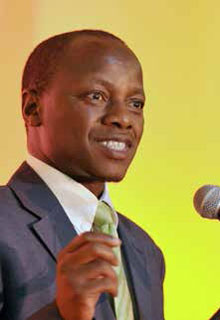 The Minister, who was born on 15 April 1960, in the village of Xikundu in Malamulele, Limpopo (then known as the Northern Transvaal), and his two protectors – Sergeants Lawrence Lentsoane and Lesiba Sekele – died on the N1 freeway between Polokwane and Pretoria when their car crashed into a truck that was reportedly making an illegal U-turn.
The Minister, who was born on 15 April 1960, in the village of Xikundu in Malamulele, Limpopo (then known as the Northern Transvaal), and his two protectors – Sergeants Lawrence Lentsoane and Lesiba Sekele – died on the N1 freeway between Polokwane and Pretoria when their car crashed into a truck that was reportedly making an illegal U-turn.
He would have celebrated his 55th birthday this month.
While the nation is still in shock at the Minister’s untimely death, tributes have poured in from all sectors of the society with many describing him as a gentle giant with humility who always shunned his VIP status.
A Grounded Leader
Author and commentator Busani Ngcaweni, who is also a Deputy Director-General in the private office of the Deputy President, wrote in the Sowetan newspaper: “He [Minister Chabane] understood the concept of leading from the front, always seeking new, innovative ways of serving the public better and faster – and was always humble that he is known to have refused to have a junior officer to carry his bag”.
The Minister’s humble nature also took those that worked with him by surprise on several occasions.
The Government Communication and Information System’s Deputy Director-General for Content Processing and Dissemination Harold Maloka, once the Minister’s media officer in The Presidency, wrote in the Sunday Times how a visit to the bank in February 2010 showed him a side of Minister Chabane that he did not know.
A lady in her 60s had spotted the Minister at the Savannah Mall in Polokwane. She approached him and got on her knees calling him “Muchaviseki” – a Xitsonga word that means “the respected one”.
“In response and acknowledgement of this human gesture, he knelt as well, in his formal ministerial suit, to return her greeting.
“It was at this very point that I was struck completely afresh by his humility, an amazing sense of mutual respect in an exchange of pleasantries between these two strangers,” recalled Maloka.
The Minister had a strong background as a political activist and a musician with a clear record in positions of leadership.
His innovative qualities are his legacy, and he was always at the forefront of starting new projects during his time in the public service, and implementing them effectively.
In 1997, Minister Chabane was appointed as a member of the executive council (MEC) in the Premier’s office in Limpopo.
After his appointment as the MEC for Public Works and leader of government business in the Limpopo Legislature the following year, he established the province’s Roads Agency – the first institution of its kind in South Africa.
At the time, Minister Chabane also led the process of training unemployed people under the Gondolashu Construction Programme, which paved way for the successful Expanded Public Works Programme (EPWP), which today skills and employs millions of South Africans in rural and township communities. In 2005, he was appointed as MEC for Economic Development, Environment and Tourism in Limpopo, where he pioneered the establishment of the annual Marula Cultural Festival, which is now celebrated every year.
Music, sport and culture

Minister Chabane was involved in music and poetry. It was while he was on Robben Island, that he learnt music theory and how to play the harmonica. He became an accomplished musician, and he, together with his best mentor, Besil Makombe started establishing the mbira group The Movement.
This band released five albums: “Seke Vs Xikundu” and “Xai-Xai”, “Duma”, “Mbira Instrumental” and “The Best of Movement”. He won several awards, amongst others, the SAMRO and Special Music Awards from the SABC in 2010 and 2012 respectively.
Chabane was a keen golfer and his involvement in this sport benefitted most of the disadvantaged African golfers who played with him.
Charity
He founded the Xakani Foundation in 2009. The foundation has been organising two golf days every year since 2010 to raise funds for the following charities:
• The Peace of Educational Mind
• The South African Institute for Depression and Anxiety
• The Nthabiseng Special School – the only school in Phalaborwa for children with disabilities and special needs
• The Evangelical Presbyterian Church (Swiss Mission in South Africa).
The foundation also funds an annual visit to the coast for 20 underprivileged children.
An honourable leader
With his record of starting new projects and implementing them successfully, Minister Chabane was appointed as Minister of Performance, Monitoring and Evaluation, in 2009, a new Ministry in the President’s office, responsible for tracking and improving the quality of service delivery at all spheres of government.
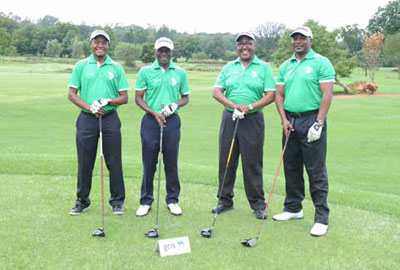 The Minister became the pride of his village and the rest of Limpopo, and in the same year tribal authorities presented him with a leopard skin during a traditional ceremony at Xikundu Village in Limpopo.
The Minister became the pride of his village and the rest of Limpopo, and in the same year tribal authorities presented him with a leopard skin during a traditional ceremony at Xikundu Village in Limpopo.
His new department was the centre of attraction, and at the time, the Sunday Times called him a “Hero on the rise”.
The Minister led the department from the ground into a fully-fledged department that now plays an important role of setting service standards for about 155 provincial and national government departments.
His department was also responsible for the Presidential Hotline, for the public to call about service delivery queries or report fraud and corruption in the public service.
When South Africa celebrated 20 Years of Freedom last year, the Minister headed the process that led to the release of the 20 Year Review document.
He was also responsible for the Government Communication and Information System, a role he stayed in until last years’ elections.
On May 25 Minister Chabane was appointed to head the DPSA.
The President also created Inter-Ministerial Committees (IMCs) to help government prioritise areas where a coordinated approach could be taken to deliver on crucial services.
The Minister was appointed as the head of IMC on State Funerals, through which he successfully led the team that organised the funeral of the late former President Nelson Mandela.
The Minister died at a time when public service wage negotiations were still on-going.
Delivering the eulogy at Minister Chabane’s funeral, President Jacob Zuma said the Minister was the ideal candidate to lead DPSA because of his passion for Batho Pele principles, aimed at putting people first to improve their lives in a caring, effective way.
“After carefully searching among us, Comrade Collins emerged as the right candidate for this task.
“He had good plans about taking the department and the public service forward, and we all have a responsibility to take his vision forward,” said President Zuma.
The President urged public servants to take forward Minister Chabane’s vision.
“We urge our frontline service staff that serve people directly to take forward Minister Chabane’s vision and serve our people with dignity, respect, courtesy, efficiency and speed… Let us put our people first in memory of Minister Chabane.”
A dedicated family man
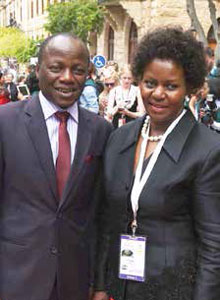
Minister Chabane married his wife Mavis Nkensani Chabane in 1994 and they have two children together.
Minister Collins Chabane’s son Matimba Chabane paid a moving tribute to his father and said his father had died in the line of duty. “It is all a matter of time and we should accept that. In the meantime we owe it to him to live like how he lived.
“He was a very structured man. My father didn’t have drama, he was always laughing,” he added.
The Minister’s daughter Tsakani Chabane sang for her father one last time at his funeral – something he always loved.
While the Minister’s children paid tribute to their beloved dad, President Zuma also used the opportunity to bid goodbye to someone he considered a son.
“Farewell freedom fighter, combatant, commissar, MK soldier, former political prisoner, a dedicated servant of the people, and accomplished musician, a husband, a father, and to me personally, a son,” said the President.
Minister Chabane is survived by his wife, Mavis, two children Matimba and Tsakani, his Mother Elizabeth, 10 siblings, and 11 siblings from his father’s second wife Johanna.
A Budget for the people
A Budget for the people Estelle GreeffBudget 2015
Every year the government publishes a Budget Review. The review estimates how much money governement can raise to be able to have to spend on priorities such as health, education, and social grants, among others.
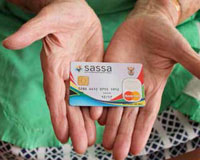 When Government puts together the budget for the country it has to consider a few issues such as the economy. The incomy plays an important role because the more the economy grows, the more revenue government will be able to collect.
When Government puts together the budget for the country it has to consider a few issues such as the economy. The incomy plays an important role because the more the economy grows, the more revenue government will be able to collect.
Government follows a detailed step-bystep process before it decides on the final national Budget. The Minister of Finance then presents the Budget in Parliament and this is followed by a consultation process.
The 2015 Budget presented by Minister Nhlanhla Nene was tabled at a time when the country was going through a challening time. While these challenges remain, government is committed to improving the lives of the poor.
Protecting social security
Over the next three years, South African Social Security Agency (SASSA), will continue to expand social grant facilities. Government remains firm in its commitment to eradicate inequality and poverty.
One way to achieve this reality is to provide support for vulnerable citizens through the provision of social grants.
By 2018, nearly 17.5 million South Africans will receive some form of social grant. A social grant is the most direct means of addressing the poverty challenge facing our country. It is targeted at the elderly, war veterans, children and people with disabilities.
| Increase in State Grants | |
| State old grant | R1 410 |
| State old age grant, over 75’s | R1 430 |
| War veterans grant | R1 430 |
| Disability grant | R1 410 |
| Foster care grant | R860 |
| Care dependency grant | R1 410 |
| Child support grant | R330 |
Boosting the income of these households reduces the effects of poverty whilst at the same time enhancing the capabilities of citizens and communities as important steps towards the creation of a developmental state. Over the next three years, South African Social Security Agency (SASSA), will continue to expand social grant facilities.
More money for education
More money for education Estelle GreeffBudget 2015
The Department of Basic Education has welcomed the increase in the funds allocated to education by Finance Minister Nhlanhla Nene in the 2015 Budget.
“This 8 per cent increase to R276.7 billion in the allocation for education reinforces this government's commitment to education as its apex priority,” said Basic Education Minister Angie Motshekga.
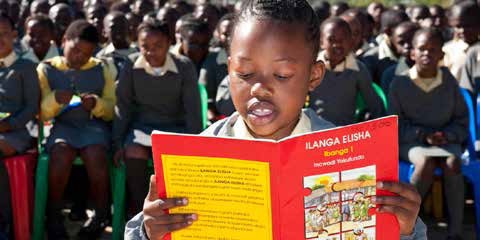 She said the budget allocation will help the Basic Education Department towards achieving the goals set out in its action plan of improving quality and efficiency across the entire system.
She said the budget allocation will help the Basic Education Department towards achieving the goals set out in its action plan of improving quality and efficiency across the entire system.
“It will go a long way to improve school infrastructure, the connectivity of schools as we progress towards the idea of the 21st century classroom, continued teacher development as well as improve the supply of learner teacher support material (LTSM) among others,” said Minister Motshekga.
Minister Nene’s budget committed to more than R7 billion over the next three years to replace infrastructure in 510 schools and to provide water to 1 120 schools, sanitation to 741 and electricity to 916 schools.
"We welcome the announcement by Minister Nene that all school building plans will be standardised and the cost of construction will be controlled by the office of the chief procurement officer," said Minister Motshekga.
The Minister said the continued commitment of all government departments to education as a tipping point towards transformation in all areas of society is evident.
“… This budget makes the education goals outlined in the National Development Plan an attainable reality," said Minister Motshekga.
Other measures to be in place for schools over three years include:
- printing and distributing 170 million workbooks at 23 562 schools;
- each pupil in Grades R to 9 will receive two books per subject each year in key subjects;
- R4.1 billion to build and support public libraries; and
- R1.1 billion for broadband connectivity in government institutions and schools.
Minister Nene also supported the central procurement of LTSM and mentioned that in a bid to tighten up financial management and prevent corruption, all books delivered to schools next year will be managed through a centrally negotiated contract.
Did you know?
A broadband connection is a high-speed internet connection. It is easier and faster to use and modem as information can be sent and downloaded much quicker.
Govt to spend more on education and health
Govt to spend more on education and health Estelle GreeffBudget 2015
Over the last 21 years, Government has made significant progress in ensuring that South Africans have access to good education and quality health care services. Over the next three years, the budget will be allocated as follows:
| R19.5 billion will go to the Department of Health for the maintenance and refurbishment of health facilities and seven other mega projects driven by provincial and national departments.
|
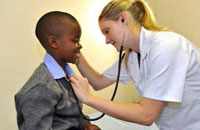 |
| R7 billion allocated to the school infrastructure backlogs conditional grant to replace infrastructure in 510 schools and provide water to 1 120 shools, sanitation to 741 and electricity to 916 schools. | 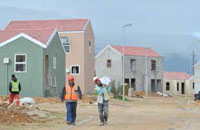 |
| R3.1 billion will be allocated to Funza Lushaka bursary scheme. It’s estimated that by 2017/18 10 200 new teachers will enter the public service. The Funza Lushaka Bursary Programme is a multi-year programme that promotes teaching in public schools. | 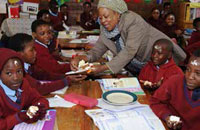 |
ECD a foundation for a better SA
ECD a foundation for a better SA Estelle GreeffA proud Sindiswa Khumalo of Kwathema Crèche walked away with the Best Early Childhood Development (ECD) Practitioner Award. On receiving her award, an elated Khumalo said teaching is more than just a job for her, it’s her passion.
Khumalo spoke to Vuk’uzenzele after receiving her award in Johannesburg, during the South African Early Childhood Development Awards (SA ECD), held at provincial level recently.
Khumalo, who has been in the ECD sector for about 30 years, said she loves her job and is very passionate about the young impressionable minds under her care.
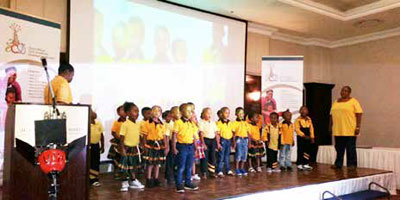 She said she had been offered jobs elsewhere but her love for children is the reason why she cannot see herself leaving her job.
She said she had been offered jobs elsewhere but her love for children is the reason why she cannot see herself leaving her job.
“I wondered what would happen to the children if I left. What if I would be replaced by someone who does not love them as much as I do? I have children who attended my crèche back in the day who and are now doctors and decent members of society. Some of them even give back to the same crèche that they attended,” she added.
Khumalo said she takes ECD very seriously and for her it is more than a job, it is her ministry.
“When I started in the industry I only had my matric. I then decided to study a threeyear Diploma in Educare through the then Johannesburg College of Education (now Wits University). It was tough in the beginning, we were not getting any support as practitioners, but now things are better,” she said.
Khumalo said she was happy when the Department of Education started giving practitioners a stipend of R1 000 a few years ago and now it has increased to over R5 000.
The awards were hosted by the National Development Agency (NDA) in partnership with the Departments of Social Development and Basic Education, SABC Education, United Nations Children's Fund (UNICEF) and the South African Congress for ECD.
The NDA said the Best ECD Centre and Best ECD Practitioner of the Year categories were awarded at provincial level, while categories like Best ECD Publication of the Year, Best Trainer of the Year, Best Training and Intervention of the Year and Best Programme Supporting Babies and Young Children with Disabilities of the Year (a new category introduced this year) were awarded at national level.
Meanwhile, Thusanong Day Care Centre, headed by principal Lerato Kekana in Majaneng in Tshwane, won the Best ECD Centre category. Kekana said she was humbled by the award.
Kekana told Vuk’uzenzele that the centre was established in 1989 and has faced a lot of challenges from the start. She said she works with eight teachers/practitioners who care for 120 learners and two gardeners.
“The number of children might increase. Since 1989 until now, we have developed more than 4 850 learners,” she said.
Kekana added that there was a lot of improvement at the centre as it had received a number of donations from the private sector and the NDA.
“I did a short course in fundraising, so I know how to approach prospective funders,” she said.
Gauteng MEC for Social Development, Faith Mazibuko, commended the winners for their dedication and hard work and encouraged those who attended the event to look up to the winners.
“Next time the judges must find it difficult to choose the winners. You must improve in everything that you are lacking. But today, all of you are winners,” MEC Mazibuko said.
She urged ECD practitioners to prioritise children’s health at their centres and ensure that they have valid health certificates.
“Remember you are dealing with lives… you do not want parents to sue you, alleging that you have fed their children poisonous or unhealthy food,” said MEC Mazibuko.
She said her department would donate educational and fun toys to all the ECD centres that were represented at the awards.
She thanked the practitioners for evolving the crèches into early learning centres, saying children no longer eat and sleep the whole day but are taught and prepared for primary school.
SA ECD awards marked their 11th year in 2015, and recognise excellence innovation, best practice and participation in the ECD sector.
NDA provincial manager Mapule Phora said about 318 centres were nominated, encouraging more centres to participate in 2016.
“Some of the centres have grown from operating from inside the shacks into proper facilities over the years, some even used advanced technological resources,” she said.
She urged those who attended the awards ceremony to go back to their communities motivated to win next year and encouraged others to participate.
SA unites to give students hope
SA unites to give students hope Estelle GreeffTransforming the country and improving the lives of all South Africans is not only the responsibility of government. All South Africans should play their part in taking the country forward by lending a hand wherever possible.
A group of students at the University of Witwatersrand (Wits University) has done exactly this, taking the plight of their peers into their hands by coming up with a creative way to ensure that they too have access to education.
Every year thousands of hopeful young people line-up at the gates of institutions of higher learning with the hope of studying further. Many times their dreams are dashed because they are unable to get funding.
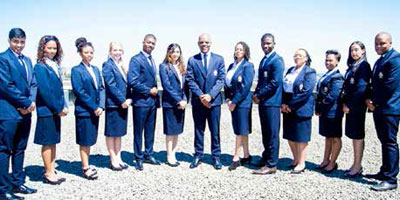 In February this year, the Student Representative Council (SRC) of Wits University started the One Million a Month Campaign to raise funds for the over 2 000 students who faced the possibility of being excluded from the 2015 academic year because they did not have enough money to pay for their tuition.
In February this year, the Student Representative Council (SRC) of Wits University started the One Million a Month Campaign to raise funds for the over 2 000 students who faced the possibility of being excluded from the 2015 academic year because they did not have enough money to pay for their tuition.
So far the SRC has surpassed its target thanks to partnerships with civil society, non-governmental organisations, individuals, academics and businesses.
The campaign is open to all South Africans and people can donate any amount starting from R10. Just 10 days into the campaign, the SRC raised R780 000.
Wits University SRC president, Mcebo Dlamini, says the response has been overwhelming since they made the call for donations from South Africans.
“We are slightly over R2 million and donations are still coming because we didn’t close the campaign. Our initial plan was to raise a million and so far we’ve made double that amount within a month,” said Dlamini.
Ordinary members of the public and prominent South Africans have made (and are making) contributions to the campaign.
The list of contributors includes, Deputy Chief Justice Dikgang Moseneke and nine of his friends who each donated R50 000, Wits University Vice-Chancellor and Principal Adam Habib also donated from his pocket, the Oppenheimer family donated R120 000, five deans of various schools at the university donated R5 000 each. The biggest donation came from Basetsana Thokoane who donated R553 000.
The Free State Provincial Government has also come on board by offering to sponsor bursaries to those affected students who are from the province.
Dlamini said the support from all sectors of society showed that South Africans valued education and if people worked together, the country could deal with the challenges it faces.
“The response is tremendous. It shows that South Africans value education and they can lend a helping hand. It has also shown us that working together we can achieve more.”
The money raised will be used to cover the registration fees of the students who faced expulsion from the university.
He added that the SRC is planning to invest some of the money so that the return on investment can be used to assist students from poor families at the beginning of next year.
**At the time of going to print, the campaign had raised more than R2 million.
Suurman Clinic leads the pack
Suurman Clinic leads the pack Estelle GreeffServing 5 300 people a month in a clinic with 14 consulting rooms and 20 staff members did not stop Suurman Clinic in Hammanskraal, north of Pretoria, from being named the Best Improved Clinic in the Tshwane district.
The people behind the success of the clinic are the 15 nurses, three clerks and two data capturers, who start their day at 7am to attend to the first patient working hard until they see the last one at 5pm when the clinic closes.
The clinic is open weekdays and on Saturday from 7am until 1pm.
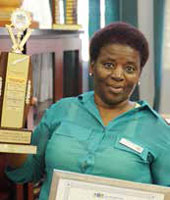 One of the nurses at the clinic, Sister Ignatia Nkhumishe, says there is a spirit of togetherness from staff members, which contributes to the clinic’s accomplishment.
One of the nurses at the clinic, Sister Ignatia Nkhumishe, says there is a spirit of togetherness from staff members, which contributes to the clinic’s accomplishment.
“We all have a very good working relationship with each other. We respect each other and have a very positive attitude. We all have the same vision of professionalism and providing service,” said Sister Nkhumishe.
Suurman Clinic provides the full primary health care package, which includes medical male circumcision, women’s health, antenatal care, chronic disease management and HIV management.
Anna Mojasagwe, a resident of Suurman who visits the clinic regularly, sys she had never experienced any problems at the clinic.
“The nurses are so pleasant and even though at times it is full, they try their best to speed up services. I also feel very proud to know that in my community our clinic is one of the best,” said Mojasagwe.
Turning the clinic around
Sister Nkhumishe says after receiving a 67 per cent rating on the National Core Standard Assessment Tool, the staff went back to the drawing board seeking ways of improvement.
“With regards to cleanliness our previous score stood at 42 per cent and our main challenge was not having cleaners in the facility.”
The intervention made was to get six volunteers from the Expanded Public Works Programme who cleaned the clinic by following a daily cleaning programme.
“There was also daily monitoring by the quality assurance champion and infection control team. Along with monthly analysis on questionnaires distributed to the patients to rate the clinic on cleanliness.”
She added that there was also a new arrangement with the procurement team to supply cleaning material timeously.
As a result of the intervention, the clinic scored 65 per cent for cleanliness.
On the availability of medicine, the clinic scored 57 per cent and in order to improve, staff members supported the pharmacy assistant with stocktaking.
In addition, every Saturday one nursing staff helps the pharmacy assistant.
The clinic was rated 89 per cent on the availability of medicine.
Regarding positive attitude, Sister Nkhumishe says the clinic previously scored 66 per cent previously but is now at 99 per cent.
She says some of the intervention strategies included ensuring that consultation rooms were prepared before the clinic opens.
“The staff were also given continuous information regarding changes and developments at the facility.”
The National Core Standards Assessment tool is available and accessible to all teams at the clinic.
“Self assessment and team assessment is done quarterly. Our manager also gives feedback from the suggestion box on a monthly basis.”
She adds that the clinic was previously rated 59 per cent on public health awareness and their current score is 72 per cent.
“We do monthly events that are in accordance with health awareness days on the health calendar.
Sister Nkhumishe says teamwork has contributed to the success of the clinic.
She adds that each professional nurse is allocated a domain within the clinic to be in charge of and also presents a report to staff on the functionality of the section.
If gaps are identified from these reports an action plan is introduced and monitored monthly to fill the gaps.
The facility also gets full support from the sub-district quality assurance coordinator.
Chief Director for Tshwane District Health Services Mothomane Pitsi, who is from the Gauteng Department of Health, said Suurman Clinic won the Best Improved Clinic in the district because of its performance when measured on the National Core Standard Assessment Tool.
He added that the clinic had moved from 67 per cent to 84 per cent in their last assessment.
“Benchmarking on best practices from institutions like Suurman will help other facilities to improve,” said Pitsi. Meanwhile, the Department of Health is planning to roll out the Ideal Clinic Realisation Maintenance programme to all clinics over the next five years.
This programme will see the improvement of the quality of care provided in over 3 500 primary healthcare facilities around the country, which consists of government clinics and community health centres.
Understanding autism
Understanding autism Estelle GreeffWith the 2nd of April being World Autism Awareness Day, there are many misconceptions about the disability. Many autistic people find the world to be an extremely scary place where people, places and events become confused and jumbled into a big mess that is difficult to understand.
WHAT IS AUTISM?
Autism spectrum disorder is a complex developmental disability that typically appears during the first three years of life and affects a person’s ability to communicate and interact with others.
Autism is believed to be combination of a genetic and environmental factors and affects four to five times more boys than girls. The disorder largely affects communication abilities; this is why most parents don’t know that their child is autistic until around the age of two or older.
TYPES OF AUTISM
There are different types of autism and different cases vary from mild to severe.
AUTISM OR AUTISTIC DISORDER
What it is: A collection of developmental disorders in which a child engages in repetitive behaviours and has trouble communicating and connecting with others. It’s usually diagnosed around age two or three, although some signs show up earlier. Symptoms can be mild to severe.
REGRESSIVE AUTISTIC SPECTRUM DISORDER
What it is: Like autism, except that a child appears to develop normally until 18 to 24 months, then starts to regress. It occurs in about 20 to 30 per cent of children with autism spectrum disorders.
PERVASIVE DEVELOPMENT DISORDER
What it is: A child has a few autistic traits but doesn’t meet the full criteria for an autism diagnosis.
ASPERGER'S SYNDROME
What it is: A milder form of autism, usually diagnosed between ages two and six, in which a child has good language skills and average to above-average intelligence but is socially awkward and engages in odd, repetitive behaviours.
CHILDHOOD DISINTEGRATIVE DISORDER (CDD)
What it is: A very rare disorder in which normally developing children lose motor, language, social, and potty skills around ages two to four.
RETT SYNDROME
What it is: An extremely rare disorder, similar to CDD, which occurs only in girls.
SYMPTOMS OF AUTISM
- Lack of or delayed spoken language.
- Repetitive mannerisms or tics such as flapping of hands.
- Lack of eye contact.
- Lack of interest in family members or friends.
- Lack of make-believe playing.
- Fixation with specific objects, or parts of objects.
Despite the effects of autism on the brain, many autism sufferers display extremely high levels of intelligence and there seems to be a particular pattern of an ability for a memory of numbers and patterns in these individuals.
The cause of autism is unknown, however, it always becomes apparent in the early years of a child’s development.
It is for this reason that most experts believe it to be a combination of genetic and environmental factors, although there is no scientific proof on the subject.
Because of this there is no way to knowingly prevent autism, nor is there a cure for it.
The lack of diagnosis in developing countries means that the World Health Organization is unable to give any statistics on the global incidence rate.
This lack of diagnosis also means that the condition of children with autism is likely to get worse, as although there is no cure for the disorder, early intervention has been proven to lead to significantly better results.
Intervention ranges from medical and dietary treatment to psychological therapy, but because no two cases of autism are the same, there are no set rules of recommendation for improvement.
Additional information from www.parents.com
e-learning for Western Cape schools
e-learning for Western Cape schools Estelle GreeffThe Western Cape Department of Education is to introduce e-learning at schools.
A large number of schools across the province stand to benefit from the implementation of e-learning.
“Three thousand and fifty classrooms across 248 schools will benefit from our Smart Classroom Project over the next five financial years.
“R53 million will be spent during the current financial year to convert 1 583 classrooms to smart classrooms,” the Premier Helen Zille said during her State of the Province Address.
She added that the implementation of e-learning was expected to improve the quality of education in the province.
“It is designed to make a major contribution towards improving the quality of teaching and learning in the province and entrench the skills people need to participate in our technology-driven economy.” The Premier said the department had allocated millions for the project.
“We have allocated nearly R730 million over the next three years to establish ICT infrastructure and e-learning in schools.”
The department is developing Local Area Networks (LANs) to connect schools and classrooms.
She said that over 600 schools would have LANs installed.
“We aim to install a LAN in 610 schools (including for learners with special educational needs) over the next five years.”
Premier Zille also announced that infrastructure would be improved in schools.
“Five hundred of our poorest schools will also receive refreshed computer labs over the next five financial years.
One hundred and twenty-six laboratories will be completed by the end of April,” she added.
Teachers will not be left behind as they will receive training, said Premier Zille.
“In order to ensure that teachers can adapt to the changes technology will bring in the classroom, our in service teacher training will focus primarily on the use of technology and good teaching methods to convey curriculum content,” she added.
Health services boost for rural KZN
Health services boost for rural KZN Estelle GreeffRural communities in KwaZulu-Natal will benefit from the deployment of over 200 medical practitioners across the province.
The province’s MEC for Health, Dr Sibongiseni Dhlomo, says the deployment of the practitioners is in line with government’s efforts to bring services closer to people.
“This is in line with the United Nations Convention on the Rights of Persons with Disabilities article 26 where it is stated that the provision of rehabilitation should be offered as close as possible to where people live.
“It also helps at improving accessibility and making health services affordable to our people wherever they are,” Dr Dhlomo explains.
He has welcomed a group of 171 therapists that include physio, occupational and speech therapists as well as the 30 dentists who will be based in institutions across the province.
The 201-strong team of recently qualified medical professionals received orientation and induction at the Inkosi Albert Luthuli Central Hospital.
They will spend 60 per cent of their time doing community work and the remaining 40 per cent at the hospital level.
Bethesda, Hlabisa, Manguzi, Mosvold and Mseleni hospitals will each receive two physiotherapists, two occupational therapists and one audiologist.
Three of the 30 dentists will be serving at the Hlabisa and Mseleni hospitals in the uMkhanyakude District Municipality in Manguzi.
Other rural hospitals that will receive dentists include Christ The King, St Appollinaris, Rietvlei, EG and Usher Memorial, which all fall under the Harry Gwala District Municipality.
“With this allocation we are trying by all means to ensure that our patients who visit health care institutions, including those that are in the rural areas, get a full package of services in their own areas.
“We have also ensured comfort for both the therapists and dentists by giving them state accommodation as well as rural allowance as we eventually wish to retain them upon completion of their community service,” says Dr Dhlomo.
Community service for doctors and dentists was introduced in the country in 2000 by the then Minister of Health, Dr Nkosazana Dlamini Zuma, and then expanded to cover therapists in 2003.
Dr Dhlomo says this has benefited rural disadvantaged hospitals and communities, who now receive much-needed rehabilitation and oral health services closer to their homes.
Eastern Cape to focus on rural development
Eastern Cape to focus on rural development Estelle GreeffDeveloping the agricultural landscape of Eastern Cape and paying attention to previously neglected rural areas in the province is top priority for Premier Phumulo Masualle.
“During this term we are going to devise measures and strategies to tap on this potential to ensure the contribution of agriculture in improving the province’s economy, particularly the rural economy,” he said during his State of the Province Address.
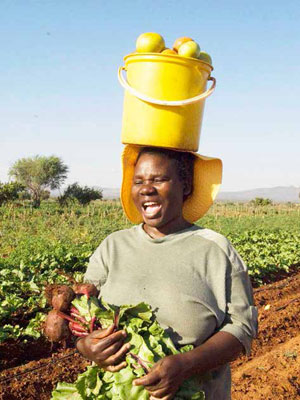 “….we are emerging from a legacy of severe neglect of our rural areas. However, through our priority on stimulating rural development, land reform and food security, we are resolute in reversing this legacy, and in making rural areas to become viable and sustainable communities,” added Masualle. Premier Masualle said one of the ways of stimulating this development is by ensuring that the right people benefit from government’s land redistribution programme.
“….we are emerging from a legacy of severe neglect of our rural areas. However, through our priority on stimulating rural development, land reform and food security, we are resolute in reversing this legacy, and in making rural areas to become viable and sustainable communities,” added Masualle. Premier Masualle said one of the ways of stimulating this development is by ensuring that the right people benefit from government’s land redistribution programme.
“In keeping with the vision of the Freedom Charter, we are committed to ensuring that land is redistributed and shared equitably amongst those who work it, in order to banish famine and land hunger.”
Apart from redistributing land, the province is also implementing a Rural Development Strategy. The strategy is aimed at cultivating thousands of hectares of land between now and 2019.
“Our target is to cultivate 300 000 hectares by 2019. Over 17 503 hectares of land were ploughed in this year alone. This is against the 12 888 hectares of land which were ploughed over the past three years,” explained Premier Masualle.
The province’s feeding schemes have also helped feed many households.
“Over 12 395 households benefited from food security and nutrition initiatives such as Siyazondla, Letsima and homestead food gardens across the province.”
Premier Masualle added that rural agricultural infrastructure would receive attention from government to boost small-scale farmers.
“We are also going to improve investment in agriculture by developing more rural infrastructure in order to support the expansion of production and employment; small-scale farming and rural development.
“Key in this regard will be the building of infrastructure for processing agricultural products, including abattoirs, dairy infrastructure, aquaculture incubation schemes and rural tourism infrastructure,” he said.
Tsolo Agricultural College brings hope
Tsolo Agricultural College brings hope Estelle GreeffThe reopening of the Tsolo Agriculture and Rural Development Institute (Tardi), near Tsolo in the Eastern Cape, will not only help attract and skill rural youth but it will also help communal farmers improve their farming skills.
According to Premier Phumulo Masualle, the Tardi will help boost agricultural knowledge in the province and country, and develop the province into the nerve-centre of agricultural activities.
“Our province should produce food and feed the whole country. We can be the heartbeat of the country in providing the necessary skills and the reopening of the institution is a big step towards realising that,” he said.
The Department of Agriculture, Forestry and Fisheries has invested R8 million to revamp the institute. So far, a temporary livestock clinic has been built while a permanent structure is under construction.
There are currently 32 registered students at the institute studying towards a Diploma in Animal Health.
Premier Masualle encouraged the students to grab the opportunity given to them with both hands.
“This is an opportunity of a lifetime and we are proud of you. Compensate this opportunity by working hard and bring good results in order to revive the pride of this institute,” he said.
Minister of Agriculture, Forestry and Fisheries, Senzeni Zokwana, urged the students to study hard and improve their skills.
“Your books should be your friends from now. We don’t want only certificates, we also want skills and knowledge. This college is redeeming the esteem of agriculture knowledge.”
MEC for Rural Development and Agrarian Reform, Mlibo Qoboshiyane, emphasised the importance of partnerships between emerging and commercial farmers. He added that some commercial farmers had volunteered to be visiting lectures at the institution.
One of the students at the institution, Noncedo Luma, said she would not take the opportunity given to her and her peers for granted.
“As rural children who have faced challenges in furthering our education we will do our best to excel.
“We are happy because after acquiring the necessary skills we will be able to find or create employment. We want to make this institute to be among the best in South Africa,” she said.
Renewable energy products energise community
Renewable energy products energise community Estelle GreeffFor a long time, the people of Schmidtsdrif, which falls under the Siyancuma Local Municipality in the Northern Cape, relied on open fires for cooking and candles for light.
This was due to severe electricity challenges in the area.
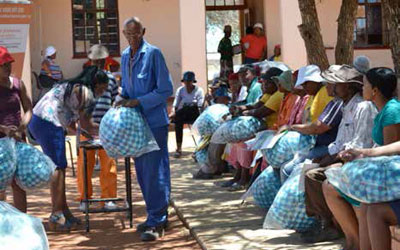 However, the Department of Rural Development and Land Reform has come on board to make the lives of the people in the community easier. The department donated energy renewable products to about 80 households in the village – as part of the Comprehensive Rural Development Programme.
However, the Department of Rural Development and Land Reform has come on board to make the lives of the people in the community easier. The department donated energy renewable products to about 80 households in the village – as part of the Comprehensive Rural Development Programme.
The community received geysers with a capacity of 150 litres and wonder bags. A wonder bag is equipment used for cooking and cooling and has a guarantee of five years.
Maggie Noko from Schmidtsdrif says the donations will go a long way in helping her family.
“I am very excited and grateful for these energy products awarded to us today. I am also very fascinated by this bag that one can use to reduce the cost of electricity.”
The department has set aside R2 703 186.00 in the renewable energy project and it will be rolled out in Pniel and Sydney on Vaal. Eighty-nine households have been targeted for the next round of donations.
*Lorato Sehularo works the Department of Rural Development and Land Reform.
Moving towards a safer South Africa
Moving towards a safer South Africa Estelle GreeffThe South African Police Service (SAPS) has fasttracked programmes aimed at providing new infrastructure and improving those that already exists as it strives to make the country safer. This is in line with the National Development Plan and the Rural Safety Strategy.
Speaking at the Justice, Crime Prevention and Security Cluster (JCPS) media briefing recently, Defence and Military Veterans Minister Nosiviwe Mapisa- Nqakula said new police stations were being built and existing ones maintained in rural areas.
“Six new stations are being built in the North West, Mpumalanga and Limpopo, including Muyexe Village in Giyani, which is a Presidential nodal point.
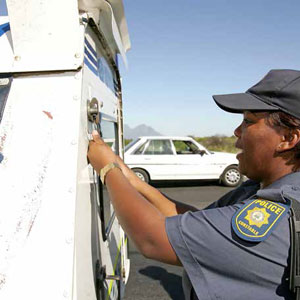 “To ensure that integrated crime prevention and combating strategies are implemented, the Rural Safety Strategy has been fully implemented at 117 police stations countrywide.”
“To ensure that integrated crime prevention and combating strategies are implemented, the Rural Safety Strategy has been fully implemented at 117 police stations countrywide.”
The strategy was developed in 2009/10 in partnership with the South African National Defence Force, agricultural unions and the then Department of Agriculture and Land Affairs.
“Special attention is also being given to improve forensics, crime investigations, and prevent crimes against women and children, including efforts to meet competency standards for all trainees in these areas,” she added.
Curbing sexual violence
The Minister said government was concerned about reports of sexual violence in the country and continued to identify measures to deal with the crimes.
“As part of our commitment to support victims of sexual violence, 33 regional courts have been upgraded into sexual offences courtrooms.”
"Collaborative efforts with the lesbian, gay, bisexual, transgender and intersex groups, civil society organisations and government departments in the JCPS Cluster through a National Task Team, are beginning to yield positive results.”
She said 22 of the sexual violence cases had been finalised and offenders sentenced to periods ranging from six years to a maximum of 30 years in prison.
While 11 cases were withdrawn for various reasons including, among others, reluctant witnesses and tracing of perpetrators and victims.
Twenty-three pending cases were receiving urgent attention from the SAPS, with dockets being recalled and re-examined.
Social Development Minister Bathabile Dlamini, who is the chairperson of the Social Cluster, said government continued to implement a number of programmes and campaigns that were aimed at removing all barriers to women empowerment and fighting genderbased violence.
“To deal with the root causes of gender-based violence, the Integrated National Programme of Action, aimed at addressing violence against women and children, is being implemented.”
“At the heart of this programme is the yearlong coordinated and comprehensive strategy to transform society’s attitudes, practices and behaviours against violence.”
She added that the recently launched 356 Days of Activism programme in partnership with civil society, focused on the participation of men and boys, which would promote the collective responsibility of all members of society to play their part in preventing violence against women and children.
“To support and empower survivors of violence, a 24-hour Gender-Based Violence Command Centre was established. In 2014 alone, the centre provided support and counselling to 2 599 distraught callers.”
Call the 24-hour Gender-Based Violence Command Centre on: 0800 428 428 or by dialling *120*7867# (free) from any cell phone.
Police need your help
Police need your help Estelle GreeffThe South African Police Service (SAPS) has appealed to the public to help in the nabbing and tracing 25 suspects wanted in connection with various crimes committed countrywide.
Crimes alleged to have been committed by the suspects range from robbery, fraud, murder and rape.
Over the years partnerships between the SAPS and members of the public have been, and continue to be fruitful and have led to the arrest, successful prosecution and imprisonment of many criminals.
The National Development Plan also indicates that local-level communities play an active role in community safety. To achieve a safe and secure society by 2030, there needs to be an integrated approach to make safety and security a reality for all South Africans.
Last year Police Minister Nathi Nhleko said during his Budget vote that partnerships between police and communities was important in the fight against crime.
“In pursuing our ideal of a safe and secure environment, we are conscious of the fact that our role as the police service is at the tail end of this process. It is for these reasons that we are advocating for an integrated approach to issues of policing and social stability.
“For us to succeed in this approach we need to work with other organs of state, business, non-governmental organisations, research and tertiary institutions,” said Minister Nhleko at the time.
The SAPS has urged anyone with information on the whereabouts of these suspects to contact the respective investigating officers or alternatively, Crime Stop on 08600 10111 or SMS the information to Crime Line on 32211. Anyone who provides information will remain anonymous.
DNA to be the centre of crime investigations
DNA to be the centre of crime investigations Estelle GreeffThe implementation of the Criminal Law (Forensic Procedures) Amendment Act of 2013, popularly known as the DNA Act, has left criminals with nowhere to hide.
The Act will result in about 5 500 detectives have been trained in taking buccal samples, which are cells found on the inside of the cheek.
This was revealed during the 3rd Forensic Service Conference held at the Council for Scientific and Industrial Research (CSIR) in Pretoria recently.
The DNA Act, which came into effect on 31 January 2014, provides the legal framework to make forensic DNA examination one of the most powerful investigative tools available for law enforcement and to identify the perpetrators of crime.
Speaking at the conference, National Police Commissioner General Riah Phiyega said: “The public interest which is served by the DNA Act is important, especially in cases of violent crimes where DNA matching has been proven to be invaluable in matching a suspect to a crime scene.”
General Phiyega added that the DNA Act would provide strict safeguards and penalties to ensure that forensic materials were collected, stored and used only for purposes related to the detection of crime, the investigation of an offence or prosecution.
The Act also stipulates that there should be a National Forensic DNA Database, which would help to gather evidence, eliminate suspects and safeguard people against wrongful convictions or other miscarriages of justice.
Police Minister Nathi Nhleko also appointed a Forensic Oversight Board, which would monitor the implementation of the DNA Act.
“The board will monitor the implementation of the DNA Act regarding the attendance and processing of crime scenes, the collection and storage of exhibit material and DNA samples, the performance of the Forensic Science Laboratory and the National Forensic DNA Database of South Africa.”
The Minister added that the board would ensure compliance on ethical and privacy issues.
“It would be a grave mistake if we focus all our efforts solely on forensic DNA evidence and ignore other forensic evidence at crime scenes. We need to continually empower all our members attending and processing crime scenes, including the first responder to a crime scene to understand their roles, responsibilities and to respect the crime scene.”
“The correct way of handling, securing and protecting evidence from compromise is paramount in ensuring a quality forensic product and supporting the judicial process,” he said.
General Phiyega called upon all forensic examiners to be passionate about their craft and to strive at improving their knowledge and skills in their specialised field.
During the conference the South African Police Service revealed that the Forensic Services has made progress in the reduction of the backlog.
Since the 2009/10 financial year, forensic laboratories reduced the backlog from 59 023 cases to a commendable level of about 4 440 case entries, which shows a 92 per cent backlog reduction up to the third quarter of the 2014/15 financial year.
What is DNA?
DNA is a long molecule that contains coded instructions for the cells. Our DNA is inherited from our parents. We resemble our parents simply because our bodies were formed using DNA to guide the process – the DNA we inherited from them.
We may resemble our parents, but we are never exactly like them. This is because each child gets only some of the DNA each parent carries. About half our DNA comes from our mother, and half comes from our father.
Additional information from: www. seqcore.brcf.med.umich.edu
SOPAs
SOPAs Estelle GreeffThe Premiers of the country’s nine provinces and their provincial governments have major plans to improve the lives of the people who live there. Details of these plans were outlined recently when the Premiers delivered their State of the Province Addresses.
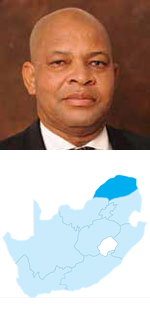 Premier Stanley Mathabatha
Premier Stanley Mathabatha
Limpopo attracts international investment
Limpopo has become a destination of choice for international investors, says Limpopo Premier Stanley Mathabatha. “During our trade and investment mission to the People’s Republic of China in October 2014, we signed memorandum of agreement with big investors.
“The first memorandum of agreement was signed with Hong Kong Mining Exchange Company (Hoi Mor) for the establishment of South Africa Energy Meturlligical Base Project,” he said during his State of the Province Address (SOPA). The project, which has an investment value estimated at R38.8 billion, will be based in the Musina Special Economic Zone, and will create 19 000 direct jobs over a period of three years.
The South Africa’s Women Investment Holdings has also entered into a joint venture agreement with Jidong Development Group and China Africa Development Fund for a R1.65 billion investment in cement manufacturing in Thabazimbi.
The construction, which started in 2014, was due to be completed last month.
“I have no doubt that these investments will add value to our efforts of expanding the productive capacity of our economy,” said Premier Mathabatha.
Investing in agriculture
“We opened Madzivhandila and Tompi Seleka Agricultural Colleges at the beginning of this year.
“The colleges are now fully functional and operational. They have a student enrolment of no less than 140,” he said.
Premier Mathabatha said the curriculum content has been restructured and developed to produce agricultural economists, extension officers, pasture and soil scientists, agronomists and horticulturalists.
The curriculum is also integrated with other disciplines offered by the University of Limpopo and the University of Venda.
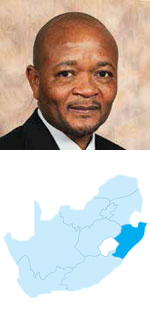 Premier Senzo Mchunu
Premier Senzo Mchunu
Curbing maternal deaths high on KZN’s priorities
The reduction of maternal, neonatal and child mortality will be the focus for the KwaZulu-Natal Provincial Government over the next five years.Delivering the State of the Province Address (SOPA), Premier Senzo Mchunu said despite persistent poverty, the province has seen a significant decline in the number of children underweight for the under-five age group from 44 per 1 000 in 2010 to currently less than 14 per 1 000.
The province has also seen a decline in the under-one year mortality rate from 10.8 per cent in 2010 to a current 7.3 per cent.
“We have seen a maternal mortality in facility ratio of 138 per 1 000 births, down from 195/100 000 in 2010. Life expectancy for males is up from 49 to 54 and for females from 50 to 59,” Premier Mchunu said.
The province will speed up prevention of mother-to-child transmission of HIV by reducing vertical transmission. It will speed up the implementation of the Campaign on Accelerated Reduction of Maternal and Child Mortality in Africa.
The province will also speed up the implementation of Phila Mntwana campaign at community level to increase the reach for children under five years and ramp up TB screening and treatment in children in this age group.
“We aim to reduce the number new HIV infections by 50 per cent by 2016 and reduce the impact of HIV and Aids by expanding access to an appropriate package of treatment care and support to 80 per cent of all people diagnosed with HIV,” Premier Mchunu said.
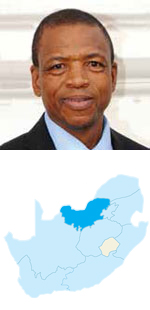 Premier Supra Mahumapelo
Premier Supra Mahumapelo
NW to address water challenges
The North West Provincial government as set aside more than R100 billion to improve infrastructure over the MTEF.
Speaking during his State of the Province Address, Premier Supra Mahumapelo said the Infrastructure Budget includes all the provincial departments and all 23 municipalities.
“This budget will be used to fund construction of roads, water and sanitation, schools, health infrastructure, houses, agriculture, arts and tourism infrastructure across all 383 wards in the Province,” said Premier Mahumapelo.
The Department of Water and Sanitation has made available R1.9 billion to deal with water and sanitation infrastructure challenges in the province.
“Projects are at different stages ranging from planning to implementation while some phases have been completed.” This excludes commitments of R705 million and R312 million for provincial roads maintenance and construction funded through Presidential Infrastructure Coordinating Committee (PICC) under Strategic Infrastructure Projects Programme 4 (SIP 4).
These projects are expected to address the challenges of water supply at various areas such as Madibeng, Bloemhof, Schweizer Reneke, Setlagole, Mafikeng.
The premier also said that the province is working hard to address the housing backlog. To date, 223 591 houses have been built since 1994, consisting government R13 billion.
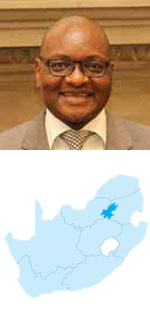 Premier David Makhura
Premier David Makhura
Revitalising Gauteng’s township economy
The Gauteng Provincial Government has set aside more than R160 million to improve and unlock the potential of the township economy.
Premier David Makhura made the announcement while delivering his State of the Province Address (SOPA) saying that the money would go a long way in addressing unemployment, poverty and inequality.
“We must work towards conditions where every rand generated from the township economy circulates within the township economy and benefits township residents,” said Premier Makhura.
In addition, the three metros (Johannesburg, Tshwane and Ekurhuleni) have set aside R3 billion, R22 million and R150 million, respectively, to support the township economy and township entrepreneurs over a period of five years.
In Diepsloot, MEC Lebogang Maile announced that about 160 township entrepreneurs involved in light manufacturing and other productive activities will benefit from the R1.6 billion investment in the Riversands/ Diepsloot SMME Incubation Hub.
Seven new township hubs will be established in various townships in the province. The hubs will assist and support township businesses.
The new township hubs will be established in Ennerdale, Hammanskraal, Mabopane and Reiger Park.
Furthermore, the industrial parks in Katlehong, Orlando, Residentia, Khutsong and Ennerdale will be revitalised, MEC Maile said.
The provincial government has also, in the last three quarters, made some strides on employment opportunities.
Launched in December 2014, three months ahead of schedule, the Gauteng Provincial Government’s initiative that aims to give hope, skills training and entrepreneurship skills to 500 000 young people of Gauteng, Tshepo 500 000, is already making a difference in the lives of youth.
As at the end of quarter three, work opportunities created through the National Youth Service, Zivuseni programme, Department of Cooperative Governance and Traditional Affairs funded sites and with partners such as the Independent Development Trust and various non-profit organisations tallied 165 516.
On projects implemented through government’s infrastructure capital works, the province has registered phenomenal progress.
Over the next four years, the Gauteng Provincial Government’s total investment in infrastructure development will be more than R32 billion, while Gauteng municipalities will spend R94 billion over the same period.
In the next five years, township enterprises will also get more business from government.
“We have now committed to set aside 30 per cent of public procurement budget for township enterprises over the next five years,” said Premier Makhura.
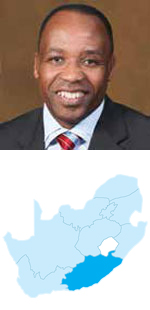 Premier Phumulo Masualle
Premier Phumulo Masualle
Job creation high on Eastern Cape’s agenda
Eastern Cape Premier Phumulo Masualle says the province will focus on creating jobs and sustainable livelihoods in 2015.
The province aims to create 129 597 job opportunities through the Expanded Public Works Programme (EPWP) and 37 000 through the Community Works Programme (CWP).
“We have to do this against an economic outlook characterised by an economy that records one of the highest unemployment rates in the country. We are rising to the task of creating sustainable jobs for our people,” he said during the State of the Province Address.
The unemployment rate in the province currently stands at 30.8 per cent, while youth unemployment stands at 50 per cent.
Premier Masualle said 24 737 jobs against a target of 13 234 had been created through economic agencies such as the Eastern Cape Development Corporation (ECDC), East London Industrial Development Zone (ELIDZ) and the Coega Development Corporation (CDC).
The province is targeting 14 investments with the value of R2 237 billion in the two IDZs.
“As part of promoting the province as an investment destination of choice, we are developing an Investment Promotion Strategy aimed at creating an enabling environment for a vibrant economic growth in the province,” said the Premier.
In the 2015/16 financial year, the ECDC is expected to create 7 000 jobs opportunities, Coega 8 797 and ELIDZ 5 500.
Premier Masualle said in the coming year, jobs would be created in manufacturing, logistics, alternative energy, agro processing and services.
“In an effort to further enhance job creation, we will support 280 small, medium and micro enterprises and 70 cooperatives,” he said. This would ensure the active participation of previously disadvantaged sectors in the economy.
The province has created 35 222 work opportunities through the CWP and 155 235 through the EPWP, exceeding the planned target.
Approximately 64 per cent of the EPWP jobs benefited women, 39 per cent the youth and one per cent persons with disabilities. A total of 4 184 youths, out of a target of 3 678, have been trained through the Accelerated Professional and Trade Competency Development Programme and the National Rural Youth Service Corps.
 Premier Sylvia Lucas
Premier Sylvia Lucas
Transforming the Northern Cape
Northern Cape Premier Sylvia Lucas’s recent State of the Province Address focused on transforming the provincial economy and renewable energy initiatives.
About 18 000 people were employed in the province by the end of 2014, mainly in the agriculture and construction sectors.
Renewable energy initiatives
Premier Lucas stated that Eskom had connected 950 megawatts of renewable from Independent Power Producers to the grid. Eskom spent over R300 million on capital improvements in the Northern Cape, which include the new Schmidsdrift Substation and the Canal Substation near Vanderkloof.
The Premier said construction of the highvoltage lines critical for manganese mining in the Hotazel area would be completed in the first half of 2015.
The new 400 kilovolts line will provide power to the Kathu/Hotazel area.
Between April and December 2014, some 2 000 households were connected to the electricity grid and a further 1 058 houses were expected to be connected to the grid before March 2015.
Infrastructure development in the province over the next three years will include:
- R170 million on road resealing, which includes the Loeriesfontein to Nieuwoudtville road; the Philipstown to Hanover Road and MR795 in Strydenburg.
- R93 million on repairing flood damage in different areas including Petrusville, Prieska North, Neilersdrift to Kakamas and Blouputs.
- R25 million on the maintenance of bridges in the Namaqua District.
- R8 million to deal with potholes.
- R20 million on road furniture (road signs and guardrails).
- R205 million on routine and preventative maintenance throughout the province.
- R100 million on the N14 in Postmasburg that stretches over 55 km. A total of 50 job opportunities have been created. To date the project is 90 per cent complete.
- R60 million on the Hotazel to Tsineng road, in partnership with BHP Billiton mine. Phase 3 will start soon.
- R240 million for the road linking Hondeklip Bay with the N7 near Garies. Phase 1 started in November 2013 and Phase 2 of the project will start during the 2015/16 financial year.
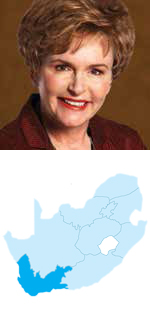 Premier Helen Zille
Premier Helen Zille
Techno boost for the Western Cape
Schools, libraries and health facilities across the Western Cape have been given a major technology boost, with access to improved broadband services.
This is thanks to a partnership between the government of the Western Cape, the State Information Technology Agency (SITA) and telecommunications services giant Neotel.
The partnership will result in over 300 WiFi hotspots covering most parts of the province.
Wireless networking – also known as WiFi - is a way of getting broadband internet without wires. It allows you to connect computers anywhere without installing extra phone lines or cables.
Speaking during the State of the Province Address, Premier Helen Zille announced that close to 2 000 government sites will receive broadband services which will in turn benefit the people of the province.
“I am therefore very pleased to announce that the Western Cape Government, the State Information Technology Agency (SITA) and Neotel signed a strategic agreement this morning to provide broadband services to approximately 2 000 government sites, including schools, libraries and health facilities over the next two to three years.”
By May next year, all sites will be connected with minimum speeds of 10Mbps under this agreement and by August 2018, most sites will be connected by fibre optic cables with 90 per cent of sites enjoying 100Mbps speeds and 10 per cent enjoying 1Gbps speeds.
According to the Premier, the improved broadband services will assist government in creating opportunities for people in the province.
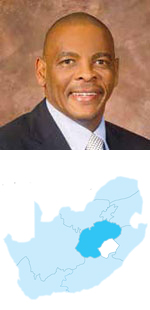 Premier Ace Magashule
Premier Ace Magashule
Boost for Free State school infrastructure
The Free State Provincial Government will focus on upgrading various infrastructure projects across the province.
So far, the provincial government has completed the construction of three schools and three school hostels in different parts of the province.
“Infrastructure projects completed during the current financial year include three new schools, namely Letlotlo Naledi Primary in Bothaville, Nthutuzelo Primary in Bultfontein and Lister Skosana Primary in Parys.
“Three new school hostels have been completed in Phillipolis, Bainsvlei and Ventersburg.
The development of school hostels is a continuation of our commitment to gradually decrease our reliance on learner transport to ensure that learners have access to quality education,” said Premier Magashule.
Two more schools have been constructed under the Accelerated Schools Infrastructure Delivery Initiative (ASIDI).
ASIDI is an initiative by the Department of Basic Education to eradicate backlogs in school infrastructure. It also aims to upgrade the standard of schools to meet the optimum functionality levels prescribed by the Norms and Standards for Schools Infrastructure and ensure that schools are safe with proper infrastructure.
“We have also completed the construction of two schools under the ASIDI programme - that is schools to be reconstructed that were built of prefabricated material.”
The schools are PT Sanders in Trompsburg and Vredefort Primary in Vredefort. Other infrastructure projects include:
- New schools in various districts in the province.
- Various projects are underway at 66 schools in the Free State. These projects will add additional classes at 31 schools, 29 administration blocks, 12 new halls, 12 new kitchens and 12 media centres and laboratories.
- Construction is in progress at 20 additional schools under the ASIDI programme.
- Ten schools will also be upgraded to full service schools in an effort to cater for learners with special needs.
- Four school hostels are under development. (Sediti Secondary and Boitumelong Special School – both in Thaba Nchu – Edenville Combined School in Edenville and Sebonakaliso Farm School in Harrismith.)
- An additional 50 new Grade R classes will also be constructed.
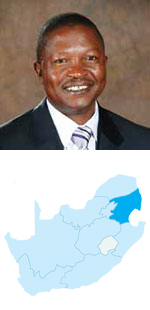 Premier David Mabuza
Premier David Mabuza
Mpumalanga focuses on infrastructure development
Mpumalanga has set aside R2.065 billion for its infrastructure development programme for 2015/16.
“Our infrastructure development programme continues to prioritise socioeconomic infrastructure such as roads, hospitals and schools,” Premier David Mabuza said during the State of the Province Address (SOPA).
As part of infrastructure development in the province, Mbombela has completed Phase One of the implementation of the Integrated Public Transport Network.
The construction of the infrastructure, which involves widening some parts of the Central Business District road network, is currently underway. The project is aimed at incorporating all modes of transport. Premier Mabuza said the Moloto Rail Corridor Development programme had also been approved.
“The Moloto Development Corridor will be a catalyst for stimulating economic growth and job creation that will benefit the province, especially Thembisile Hani and Dr JS Moroka Local Municipalities.
“It will attract private sector investment along the corridor, thereby increasing prospects for employment and local enterprise development,” he said.
Mpumalanga International Fresh Produ ce Market Premier Mabuza said the process for the acquisition and registration of land for the Mpumalanga International Fresh Produce Market had been concluded.
“All the necessary statutory compliance matters such as the environmental impact assessments have been finalised.”
The Mpumalanga International Fresh Produce Market will create the required infrastructure and logistics platform to help vegetable, fruit, citrus and meat production farmers and remove the current barriers to market.
Access to water
The provincial government, together with the Department of Water and Sanitation and Rand Water, have partnered to provide water to communities in Mpumalanga. Some R298 million was invested for Phase One to connect 24 villages, benefiting 15 000 households.
Phase 2, which costs R601 million, has started and will cover 69 villages, and benefit 23 340 households.
Boreholes will be drilled in all areas in need to provide reliable and constant water supply.
Where boreholes exist, but are nonfunctional, the Mpumalanga government will refurbish all these boreholes within the next three to five months to ensure that people have access to water.
Building a firm base for small businesses
Building a firm base for small businesses Estelle GreeffTrue to its name, Lepharo – meaning foundation of stones of knowledge – has laid the basis for about 40 small businesses in the engineering and manufacturing sector in Ekurhuleni to thrive.
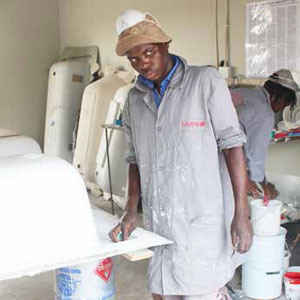 Incubation manager Zenzo Nkomo explains how the incubator works and how business owners can benefit from its services.
Incubation manager Zenzo Nkomo explains how the incubator works and how business owners can benefit from its services.
What is the name of your incubator?
The Small Enterprise Development Agency (Seda) Ekurhuleni Base metals, trading as Lepharo.
How would you describe your focus?
The identification and training of entrepreneurs and to create new businesses in the engineering and manufacturing sectors. These businesses are developed and supported until they are economically viable and no longer need Lepharo’s assistance.
Where are you based and from which areas do you recruit new incubatees?
We are based in Springs, Gauteng, and recruit from the Ekurhuleni area.
Which businesses are best suited to join?
Any engineering or manufacturing small business in need of business support and skills development can apply.
How does one apply?
Business owners can apply via Lepharo’s strategist partners – the Small Enterprise Development Agency, Impala Platinum, Exxaro and Ekurhuleni municipality, via the website or its office.
How long do businesses stay in your programmes?
Incubatees stay in the programme for a maximum of three years.
What are the two key elements of your support that sets you apart from other incubators?
Lepharo’s focus on industrial regulatory compliance and procurement support sets its services apart from other incubators.
How long have you been going for?
We officially launched in 2011.
How many businesses have been incubated with your support?
Currently we have 40 handpicked businesses on the programme and our first five businesses will graduate when they complete the programme this year.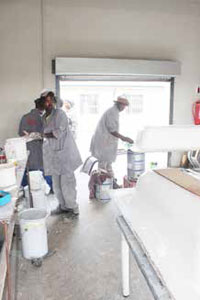
What are your fees?
We do not charge any fees.
What commitments do incubatees make before they enter your programme? And what commitment do you make to them?
Incubatees must commit to engagement meetings, progress reports as well as to successfully completing the incubation programme.
What are the average sales of your incubatees over a year in your programme? After two years? After three years?
This depends on the nature of the business.
What is the best thing you heard someone say about your incubator?
The best thing we have heard is that we mean business.
And the worst?
Incubatees say that the incubator is too strict.
What was your biggest success thus far?
We have a 99 per cent success rate for funding machinery that our incubatees who are on the programme require.
And what was your biggest failure thus far?
The failure to expand our premises in time and sync with the growing demand for our services.
Why are you involved in supporting new businesses?
It’s what we do best.
What is your biggest wish for improving the support to entrepreneurs?
A formalised link between our retainer procurement support (from government and the corporate sector) and the development of our incubation programme.
For a comprehensive list of incubators, go to www.lepharo.co.za
Incubator helps grow small business
Incubator helps grow small business Estelle GreeffStarted by two determined women in a home garage, Makisha Projects is now a thriving business.
Registered in 2010, this business is run by Sikhumbuzo Monaledi, who co-owns it with Nombulelo Shazi, Ntombizodwa Mashabane and Ntombikayise Mosikare.
One of the co-owners, Lerato Makitla, passed away last December - leaving the company with just four people in charge.
The company specialises in fibre manufacturing and design. This includes the production of bath tubs, kitchen sinks, bed lifters, car bumpers and spoilers.
In February 2013, the company joined the Lepharo Metal Base Incubator after being introduced and referred to it by an individual who spotted the business in the township.
 “The incubator trains us as entrepreneurs to create new businesses in the engineering and manufacturing sectors. We learn how to manage and industrialise our business,” said Monaledi.
“The incubator trains us as entrepreneurs to create new businesses in the engineering and manufacturing sectors. We learn how to manage and industrialise our business,” said Monaledi.
Makisha Projects has learned about compliance in tax, health safety and environment.
The company occupies two working spaces at the Lepharo Incubator premises, which gives them enough space for the production of goods.
Monaledi says that moving the company from the garage-based work space in Duduza, Nigel, to the work space in Lepharo, has encouraged the team to dream big.
The products manufactured by the company are mainly sold to people in Duduza, Soweto, Hammanskraal and Mpumalanga.
“Among the products we manufacture, the bed lifters seem to be the ones that sell the most.”
Monaledi says that in November 2013, the company applied for technology transfer funding from the Small Enterprise Development Agency (Seda), who assessed the company in February and approved the fund in March 2014.
The company has received funding worth R600 000, which was used to buy more machinery to improve production.
The company has gone through many changes since joining Lepharo two years ago. “The major changes I have noticed is that we shifted from being a part-time to a full- time operational business. We have since then taken into consideration the financial implications of growing a business,” says Monaledi.
The company employs three permanent workers - Jacky Mahlangu, Gift Malatjie and Zakhele Mtshayisa, and has become official employers who register their employees with the Unemployment Insurance Fund (UIF) and Workmen’s Compensation Fund.
“Other entrepreneurs should consider joining programmes such as this one as it will assist them in growing their businesses through monitoring and mentoring,” says Monaledi.
Monaledi adds that future plans for the business include becoming one of the major distributors in fibreglass manufacturing of bath tubs, sinks, basins and also having a stake in the auto manufacturing sector with their car bumpers and spoilers.
| What is UIF? The UIF gives short-term relief to workers when they become unemployed or are unable to work because of maternity, adoption leave, or illness. It also provides relief to the dependants of a deceased contributor. What is the Worksmen’s Compensation Fund? |
Jobs: Department of Social Development
Jobs: Department of Social Development Estelle Greeff CHIEF DIRECTOR: LEGAL SERVICES (Ref :2015/07)
CHIEF DIRECTOR: LEGAL SERVICES (Ref :2015/07)
Branch: Corporate Services
TOTAL PACKAGE: R988,152.00 per annum
Center: HSRC Building , Pretoria
This inclusive remuneration package consists of a basic salary, the states’ contribution to the Government Employees Pension Fund and a flexible portion that may be structured i.t.o. the applicable rules.
REQUIREMENTS:
An LLB Degree or equivalent qualification PLUS 3 years’ senior management experience in the Legal Services field. Knowledge of the Public Service legislation. Knowledge and understanding of drafting legal instruments. Knowledge and understanding of litigation processes in government. Knowledge of legislative processes. Knowledge and understanding of interpreting statutes, Constitutional Law, Law of Evidence, Civil Procedure, Promotion of Access to Information Act and Promotion of Administrative Justice Act. Knowledge of Social Development legislation.
Competencies needed
Strategic capability and leadership skills. Programme and project management skills. Financial management skills. Policy analysis and development skills. Information and knowledge management skills. Communication (verbal and written) skills. Service delivery innovation skills. Problemsolving and change management skills. People management and empowerment skills. Client orientation and customer focus skills. Stakeholder management skills. Presentation and facilitation skills. Risk management skills. Conflict management skills. Networking skills. Legislative drafting skills.
Attributes
Good interpersonal relations. Ability to work under pressure. Creative and innovative Ability to work in a team and independently. Confidentiality. Integrity. Reliable. Independent thinker. Cost consciousness. Friendliness and helpfulness.
KEY RESPONSIBILITIES:
Develop, draft and review legislation and other related legal instruments. Manage litigation by and against the Department. Ensure and facilitate the drafting, reviewing, vetting, negotiation and management of contracts and agreements of the Department. Ensure the provision of general legal support services and advice in compliance with law.
ENQUIRIES:
Mr TW Magwaza Tel: (012) 741-6802
APPLICATIONS TO BE FORWARDED, QUOTING THE RELEVENT REFERENCE NUMBER TO:
The Director General, Department of Social Development, Private Bag X901, Pretoria, 0001. Physical Address: HSRC Building, 134 Pretorius Street , Pretoria.
FOR ATTENTION: Ms E de Waal
CLOSING DATE: 17 April 2015
NOTE A curriculum vitae with a detailed description of duties, the names of two referees, certifiedcopies of qualificationsand identity document must accompany your signed application for employment (Z83). Shortlisted candidates for SMS posts will be required to undergo competence assessment. The successful candidate will sign an annual performance agreement, complete a financialdisclosure form and also be required to undergo a security clearance. If the candidate is applying for an OSD post, certificatesof service must be attached to the CV. No faxed or e-mailed applications will be considered. It is the applicant’s responsibility to have foreign qualificationsevaluated by the South African QualificationAuthority (SAQA). Failure to submit the requested documents will result in your application not being considered. Personnel suitability checks will be conducted on short listed candidates and the appointment is subject to positive outcomes of the checks.
Correspondence will be limited to shortlisted candidates only. If you have not been contacted within three months after the closing date of this advertisement, please accept that your application was unsuccessful. “The Depart-ment of Social Development supports persons with disabilities”
It is our intention to promote representivity (race, gender and disability) in the Public Service through the filling of this post and candidates whose transfer / promotion/ appointment willpromote representivity will receive preference.
GENERAL MANAGER: ADJUDICATION OPERATIONS (Ref :2015/08)
Independent Tribunal for Social Assistance Appeals
TOTAL PACKAGE: R988,152.00 per annum
Center: Harlequins Office Park, Groenkloof
This inclusive remuneration package consists of a basic salary, the states’ contribution to the Government Employees Pension Fund and a flexible portion that may be structured i.t.o. the applicable rules.
REQUIREMENTS:
An appropriate recognised Bachelors’ Degree Plus sufficient management experience in the field of administration. Knowledge and understanding of Social Security Law will be an added advantage. Knowledge and understanding of social assistance, PFMA and SASSA Act. Broad knowledge of relevant legislation and policies. Knowledge and understanding of record management systems.
Competencies needed
Policy development and implementation skills. Presentation skills. Training, mentoring and coaching skills. Communication and liaison skills. Coordination skills. Planning and organizing skills. Analytical skills. Problem-solving skills. Business ethics skills. People management and empowerment. Strategic capability and leadership skills. Monitoring and evaluation skills. Project management skills. Negotiation skills. Client orientation and customer focus skills. Computer literacy. Financial management skills. Research skills. Facilitation skills.
Attributes
Trustworthiness. Integrity. Patience. Accuracy. Diplomacy. Assertiveness. Compliance. Ability to work under pressure. Ability to work in a team and independently. Creative and innovative. Friendliness. Self-starter.
KEY RESPONSIBILITIES:
Manage and coordinate the pre-adjudication process. Manage medical and legal case assessment services for adjudication. Ensure adjudication of all social assistance appeals within the legislative framework. Conduct quality assurance on adjudicated files. Manage post adjudication and stakeholder communication.
ENQUIRIES:
Mr TW Magwaza Tel: (012) 741-6802
APPLICATIONS TO BE FORWARDED, QUOTING THE RELEVENT REFERENCE NUMBER TO:
The Director General, Department of Social Development, Private Bag X901, Pretoria, 0001. Physical Address: HSRC Building, 134 Pretorius Street , Pretoria.
FOR ATTENTION: Ms E de Waal
CLOSING DATE: 17 April 2015
NOTE A curriculum vitae with a detailed description of duties, the names of two referees, certifiedcopies of qualificationsand identity document must accompany your signed application for employment (Z83). Shortlisted candidates for SMS posts will be required to undergo competence assessment. The successful candidate will sign an annual performance agreement, complete a financialdisclosure form and also be required to undergo a security clearance. If the candidate is applying for an OSD post, certificatesof service must be attached to the CV. No faxed or e-mailed applications will be considered. It is the applicant’s responsibility to have foreign qualificationsevaluated by the South African QualificationAuthority (SAQA). Failure to submit the requested documents will result in your application not being considered. Personnel suitability checks will be conducted on short listed candidates and the appointment is subject to positive outcomes of the checks.
Correspondence will be limited to shortlisted candidates only. If you have not been contacted within three months after the closing date of this advertisement, please accept that your application was unsuccessful. “The Depart-ment of Social Development supports persons with disabilities”
It is our intention to promote representivity (race, gender and disability) in the Public Service through the filling of this post and candidates whose transfer / promotion/ appointment willpromote representivity will receive preference.
DIRECTOR: SOCIAL INSURANCE SCHEMES (Ref: 2015/09)
Chief Directorate: Social Insurance
TOTAL PACKAGE: R819 126 .00 per annum
Center: Harlequins Office Park, Groenkloof
This inclusive remuneration package consists of a basic salary, the states’ contribution to the Government Employees Pension Fund and a flexible portion that may be structured i.t.o. the applicable rules.
REQUIREMENTS:
An appropriate recognised Bachelor of Arts Degree PLUS appropriate management experience in policy and research. Post graduate qualification will be an added advantage. Knowledge of social security, especially social insurance. Knowledge of public finance. Knowledge of labour market developments.
Competencies needed
Analytical skills. Economic modeling skills. Numeracy skills. Financial management skills. Communication (written, verbal and presentation) skills. People management and empowerment skills. Programme and project management skills. Client orientation and customer focus.
Attributes:
Personal drive. Self- motivated. Ability to work with a team.
KEY RESPONSIBILITIES:
Assess and undertake research in the area of occupational based insurance schemes. Develop sustainable policies for insurance coverage for inclusive of death, disability, accidents and survivors benefits. Cooperate with intergovernmental departments to develop and implement death, disability, accidents and survivors benefits to mitigate the impact of work based risks and contingencies. Monitor, review and evaluate existing death, disability, accidents and survivors benefits policies and strategies to ensure appropriate and optimal coverage. Consult and liaise with civil society, stakeholders and the general public with respect to occupational based insurance schemes. Develop frameworks, strategies and blue prints to provide for policy instruments, legislation, strategies and institutions for the implementation, monitoring and oversight of occupational based insurance schemes. Ensure and facilitate civil society stakeholder involvement in the development and implementation of social insurance schemes.
ENQUIRIES:
Ms B Sibeko, Tel: (012) 741 6803
APPLICATIONS TO BE FORWARDED, QUOTING THE RELEVENT REFERENCE NUMBER TO:
The Director General, Department of Social Development, Private Bag X901, Pretoria, 0001. Physical Address: HSRC Building, 134 Pretorius Street , Pretoria.
FOR ATTENTION: Ms E de Waal
CLOSING DATE: 17 April 2015
NOTE A curriculum vitae with a detailed description of duties, the names of two referees, certifiedcopies of qualificationsand identity document must accompany your signed application for employment (Z83). Shortlisted candidates for SMS posts will be required to undergo competence assessment. The successful candidate will sign an annual performance agreement, complete a financialdisclosure form and also be required to undergo a security clearance. If the candidate is applying for an OSD post, certificatesof service must be attached to the CV. No faxed or e-mailed applications will be considered. It is the applicant’s responsibility to have foreign qualificationsevaluated by the South African QualificationAuthority (SAQA). Failure to submit the requested documents will result in your application not being considered. Personnel suitability checks will be conducted on short listed candidates and the appointment is subject to positive outcomes of the checks.
Correspondence will be limited to shortlisted candidates only. If you have not been contacted within three months after the closing date of this advertisement, please accept that your application was unsuccessful. “The Depart-ment of Social Development supports persons with disabilities”
It is our intention to promote representivity (race, gender and disability) in the Public Service through the filling of this post and candidates whose transfer / promotion/ appointment willpromote representivity will receive preference.
SA’s democracy turns 21!
SA’s democracy turns 21! Estelle GreeffThat is the day that South Africans from all walks of life will celebrate the dawn of freedom and democracy and the achievements made in moving the country away from hatred, divisions and a painful history - to build a common future together.
 Vuk’uzenzele takes a look at the significance of this day and what it means to us as South Africans.
Vuk’uzenzele takes a look at the significance of this day and what it means to us as South Africans.
On 27 April 1994, South Africa held its first non-racial, democratic elections. A new government was elected under the leadership of the late former President Nelson Mandela. A lot has been achieved over the years, but more still needs to be done to improve our country and change the lives of all South Africans.
The month is not only for reflection of how far we have come as a country, but it is also a time that South Africa celebrates its heroes and heroines through the National Orders. The National Orders are the highest awards that a country, through its President, bestows on its citizens and eminent foreign nationals.
The Constitution of South Africa
The Constitution was drafted in terms of Chapter 5 of the interim Constitution (Act 200 of 1993) and was first adopted by the Constitutional Assembly on 8 May 1996. It was signed into law on 10 December 1996.
National symbols
South Africa is unique in the fact that we can celebrate our diversity through our national symbols and National Flag, the Anthem of South Africa and the Coat of Arms.
The South African Flag is unique and was designed by former South African State Herald, Fred Brownell, and was first used on 27 April 1994.
The colours of the flag have no specific meaning - therefore no universal symbolism should be attached to the colours of the flag.
The ‘V’ in the flag symbolises the coming together of different elements of South Africa and taking the road ahead together in unity.
Among our national symbols are:
| National animal | National flower | National tree | National bird | National fish |
 |
 |
 |
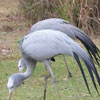 |
 |
| Springbok | King Protea | Real Yellowwood | Blue Crane | Galjoen |
Flying the flag
When the flag is displayed vertically against a wall, the red band should be to the left of the viewer with the hoist or the cord seam at the top. When it is displayed horizontally, the hoist should be to the left of the viewer and the red band at the top. When the flag is displayed next to or behind the speaker at a meeting, it must be placed to the speaker's right. When it is placed elsewhere in the meeting place, it should be to the right of the audience.
The National Coat of Arms
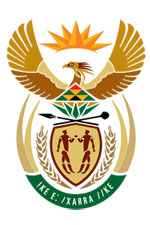 South Africa’s Coat of Arms, or state emblem, is the highest visual symbol of the state. Its central image is a secretary bird with uplifted wings, a sun rising above it. Below the bird is the protea, an indigenous South African flower, representing the aesthetic harmony of all cultures and the country flowering as a nation.
South Africa’s Coat of Arms, or state emblem, is the highest visual symbol of the state. Its central image is a secretary bird with uplifted wings, a sun rising above it. Below the bird is the protea, an indigenous South African flower, representing the aesthetic harmony of all cultures and the country flowering as a nation.
The ears of wheat are emblems of the fertility of the land, while the tusks of the African elephant symbolise wisdom, steadfastness and strength.
At the centre stands a shield signifying the protection of South Africans, above which are a spear and knobkerrie. These assert the defence of peace rather than a posture of war.
Within the shield are images of the Khoisan people, the first inhabitants of the land. The figures are derived from images on the Linton Stone, a world-famous example of South African rock art. The motto of the coat of arms - !ke e:/xarra//ke - is in the Khoisan language of the /Xam people, and means “diverse people unite”, or “people who are different joining together”.
The National Anthem
Our National Anthem is unique as it is sung in four different languages. The National Anthem was announced in 1997. It is a shortened, combined version of two anthems (‘Nkosi Sikelel’ iAfrika’ and ‘The Call of South Africa’/’Die Stem van Suid-Afrika’); sung between 1994 and 1997.
Medupi produces first power
Medupi produces first power Estelle GreeffFirst power was produced out of the Medupi power station’s Unit 6 last month.
“Eskom is pleased to announce that first power was produced out of Medupi’s Unit 6 making it the first of Medupi power station’s six units to be synchronised,” said the utility.
Synchronisation, or first power, is the process whereby the generator in the unit is electrically connected to the national power grid, in such a way that its power is perfectly aligned with all the other generators to generate and deliver electricity into the national power grid.
According to Tshediso Matona, Eskom’s Chief Executive, this is the final stage marking an exciting milestone towards full commercial power of the plant located in Limpopo.
“We celebrate the achievement with Team Medupi. The electricity flowing into the grid marks a new beginning. Within the next three months, South Africa will see Medupi Unit 6’s full potential of 794MW being fed into the South African national grid. I congratulate Team Medupi, for their efforts in achieving this important milestone for South Africa,” he said.
In anticipation of commercial operation, a power station manager has been appointed. The past six years has been spent training and developing a core set of people who will operate the cutting edge technology that makes this power station unique in the world.
“Approximately 350 men and women are waiting to join the force of South Africans making history when the unit gets operational. While Unit 6 is the first of Medupi’s six units, it should be noted that all required auxiliary services for the entire power station are ready to ensure that Medupi’s total output of 4 764MW is fully synchronised to the South African power grid,” said Matona.
Public Enterprises Minister Lynne Brown noted that the synchronisation of Medupi’s Unit 6 was a step towards full power generation and therefore, a step closer to alleviating some of the country’s energy challenges.
“This will contribute significantly to South Africa’s and the region’s economy in the long run.
“We recognise that this is only the beginning, but I am confident that achieving this significant milestone will sustain the dedication and commitment of the Eskom team as they work towards the completion of the project,” she said.
Health sciences important for Africa
Health sciences important for Africa Estelle GreeffInternational relations
Science and Technology Minister Naledi Pandor says health sciences are a top priority for Africa as the continent bears a massive disease burden.
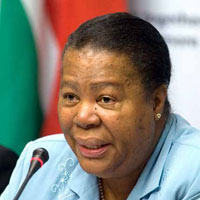 Minister Pandor was speaking at the International Conference on Particle Induced X-Ray Emission (PIXE) in Cape Town.
Minister Pandor was speaking at the International Conference on Particle Induced X-Ray Emission (PIXE) in Cape Town.
The two-day conference was organised by iThemba Laboratory for Accelerator-Based Science in partnership with the International Atomic Energy Agency, the Abdus Salam International Centre for Theoretical Physics and The World Academy of Sciences.
The PIXE conference is a biennial event at which recent developments and future prospects in particle induced X-ray spectrometry are discussed.
The event brought together physicists and scientists from various fields of application, including biology and medicine, environmental and Earth sciences, cultural heritage and materials research.
The conference was expected to give South Africa the opportunity to showcase its expertise in ion-beam analysis and to explore possible collaborations on research using the new 3.0 MV Tandem Accelerator that is to be commissioned by the Department of Science and Technology in 2017.
Minister Pandor said Africa should invest more in research initiatives like the African Network for Drug and Diagnostic Innovation and the New Partnership for Africa’s Development Biotechnology Network, which already has four hubs.
“We need to find durable solutions that hold promise for long-term change and development. This implies that we should intensify our human resource development efforts and ensure that Africa has the intellectual capacity to devote sustained attention to developing effective solutions,” she said.
The Minister urged African scientists and their counterparts in the rest of the world to work together to create new ideas to improve the quality of life of all Africans.
“All of you are aware that Africa is grappling with numerous challenges and that many in government, academic institutions and non-governmental organisations are pooling resources to devise effective responses to our most pressing challenges.
“The truth is that we will resolve problems faster if we use opportunities for continental and global partnerships effectively,” said Minister Pandor.
SA, India talk business
SA, India talk business Estelle GreeffInternational relations
Investment in infrastructure is essential to enhance economic development, intra-trade and regional integration, says Trade and Industry Deputy Minister Mzwandile Masina.
Speaking during the second leg of the 6th Annual India Trade and Investment Initiative (ITI) hosted in Kolkata, India, Deputy Minister Masina said it was important to emphasise that the bedrock of new growth in the African continent would come from infrastructure development.
“The opportunity to collaborate with Indian companies will make it possible for South Africa to realise the deliverables of the programme, in particular the North-South corridor, with emphasis on road and rail infrastructure,” he said.
The ITI forms part of the Department of Trade and Industry’s export and investment promotion strategy to focus on India as a high growth export market and foreign direct investment source.
Deputy Minister Masina urged the Indian business delegation to optimally use the ITI platform and give voice to key issues in the infrastructure, agro-processing, mining and minerals beneficiation, electro-technical, cosmetics and renewable energy sectors represented by the 25-member business delegation from South Africa attending the ITI.
He said South Africa and India share a common vision to address the triple challenges of inequality, poverty and unemployment.
“I am of the firm view that it is through initiatives of this nature that we will be able to address the challenges of unemployment, advance the fight against poverty and accelerate economic transformation within our respective countries,” said Deputy Minister Masina.
The chairperson of the Indian Chamber of Commerce, Kalyan Kar, said India’s investment in South Africa was over US$33 billion in different sectors.
Kar said Indian businesses were keen to invest and collaborate with South Africa, especially in the coal-mining sector.
Cheaper connectivity for SADC community
Cheaper connectivity for SADC community Estelle GreeffInternational relations
People living in countries in the Southern African Development Community (SADC) will be able to connect with each other at cheaper rates, thanks to the proposed Roam Like At Home programme.
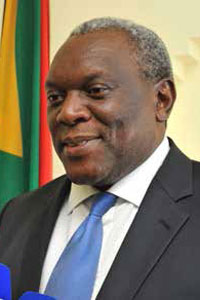 Telecommunications and Postal Services Minister Siyabonga Cwele said a new proposal to lower the cost to communicate in the region, focusing on roaming prices, was currently on the table.
Telecommunications and Postal Services Minister Siyabonga Cwele said a new proposal to lower the cost to communicate in the region, focusing on roaming prices, was currently on the table.
Information Communication and Technology Ministers discussed the proposal at a meeting held in Malawi which South Africa took part in.
“The meeting adopted the Roam Like At Home programme, which will see the implementation of wholesale and retail glide paths effective from this year,” said Minister Cwele during the International Cooperation, Trade and Security Cluster media briefing recently.
“The progressive glide path to cost-based roaming tariffs will be applied through fee reductions by a factor of 67 per cent, 33 per cent and 5 per cent over the next three years.”
With the implemented reductions, citizens in the region will connect to one another cheaper and this will also contribute to more affordable broadband access.
The Minister also said South Africa continued to broaden market integration through the Tripartite Free Trade Area (TFTA) negotiations among 26 countries of East and Southern Africa.
A number of African governments signed the TFTA agreement to create solid intra- African trade.
The TFTA agreement initially received US$1.2 billion (approximately R14 billion) in funding which came from the African Development Bank and the Development Bank of Southern Africa.
The TFTA agreement supports some of Africa’s busiest trade routes, linking the port of Dar es Salaam in Tanzania to the copper belt in Zambia and into Lubumbashi in the Democratic Republic of Congo. It then continues down through Zimbabwe and Botswana to Africa’s largest and busiest port, Durban, in South Africa.
Minister Cwele said TFTA is expected to create a market of 625 million people, and a Gross Domestic Product (GDP) of US$1.2 trillion (approximately R14 trillion).
“We expect to take these negotiations further in a Summit of Heads of State scheduled for May 2015.”
Tourism sector boost job creation
Minister Cwele also said South Africa received over three million visitors generating R20.3 billion, which contributed to the economy.
“The tourism industry is a major contributor to South African economic growth, jobs and employment our citizens. This shows that on-going efforts to showcase our country as a tourist, investment and destination of choice are bearing much needed fruits during this low global economic outlook.”
He added that tourism continued to contribute significantly to South Africa’s national economy.
“The industry’s contribution to the GDP has expanded by 200 per cent since 1990.
“Tourism directly represents three per cent of our GDP and supports over 617 000 jobs. Including indirect impacts, tourism generated 9.7 per cent of the GDP and supported over 1.4 million jobs last year.
“There is great potential for further growth, as we move towards the goal of becoming one of the top 20 global tourist destinations by 2020.”
In September, South African Tourism opened a country office in Sao Paolo, Brazil, to serve the growing markets of Latin America.
Minister Cwele also said domestic marketing campaigns were being stepped up to get more South Africans to visit their own country.
Over the past five months, much work has gone into planning to improve infrastructure that would enhance destinations offered to tourists.
“This includes more detailed planning for a new Tourism Incentive, which will be launched next year, as well as more focused leveraging of our Expanded Public Works Programme investment in physical infrastructure and skills development.”
Minister Cwele, said with regards to BRICS (the Brazil, Russia, India, China and South Africa grouping), South Africa continued to pursue value-added trade under the BRICS Forum to increase exports of value-added products.
An example of this is the Midterm Meeting of the BRICS Business Council that took place from 9-10 February 2015 in Brazil.
The Midterm Meeting is as an opportunity to monitor developments towards adopting a Second Annual Report, covering the 2014- 2015 period, at the Seventh BRICS Summit, which will take place in Ufa, Russia, in July 2015.
Hundreds walk for cancer
Hundreds walk for cancer Estelle GreeffSports, arts and culture
South Africans from all walks of life, including President Jacob Zuma, took part in the launch of the Warriors Walk for Cancer initiative led by first lady Tobeka Madiba-Zuma’s foundation.
Speaking at the launch, at the Union Buildings in Pretoria, President Zuma said cancer was becoming a major public health problem, not only in the country but in Africa as well.
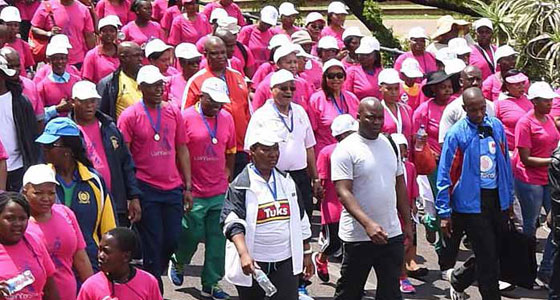 “The rates of breast and cervical cancer in the developing countries are rapidly increasing due to the impact of risk factors associated with changing lifestyles,” said President Zuma.
“The rates of breast and cervical cancer in the developing countries are rapidly increasing due to the impact of risk factors associated with changing lifestyles,” said President Zuma.
He said women in Africa suffer in many cases from non-responsive health services and also suffer from the fear and stigma associated with cancer. “Women suffer from being discriminated against by their communities, ostracised by their partners or husbands and painful deaths from cancer.”
He noted that beyond government, civil society initiatives were also helpful in raising awareness and providing support to women. The Tobeka Madiba-Zuma Foundation’s Annual Warriors Walk for Cancer contributes to raising awareness about cancer.
President Zuma said for most families, the walk is about more than just raising money or awareness.
“Let us remember that cancer is not about statistics, it is about people, families, and communities. It is about our loved ones.
“The walk is to honour a loved one lost to the disease, to celebrate another who survived and to support those who continue to fight against it…this walk will provide a platform to talk to women and disseminate information but also inform them about the right lifestyle choices,” said the President.
Most cancers are a result of lifestyle choices such as bad eating, smoking, alcohol abuse, among others. President Zuma urged people to take responsibility for their health and help government in the fight against disease.
“We cannot act irresponsibly and smoke, drink alcohol, not exercise and put on excess weight. If we do so, we place our lives at risk for the early onset of these non- communicable diseases so largely preventable.”
President Zuma said citizens needed to meet government half way in attempts to strengthen preventive measures, re-emphasising that “prevention is better than cure”.
“My wish is to see us all come together to support and empower each other. South Africans - and South African women in particular - have a generosity of spirit that I am yet to feel anywhere else in the world,” he added.
Freedom Park an untapped heritage gem
Freedom Park an untapped heritage gem Estelle GreeffSports, arts and culture
Freedom Park is an untapped liberation heritage gem yet to be fully utilised by all South Africans, says the park’s Acting CEO Jane Mufamadi.
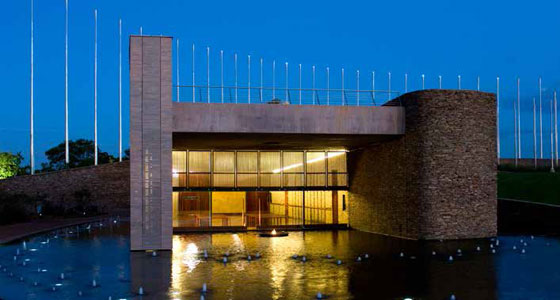 Freedom Park was among the many national and international exhibitors displaying products at Meetings Africa 2015 at the Sandton Convention Centre in Johannesburg recently.
Freedom Park was among the many national and international exhibitors displaying products at Meetings Africa 2015 at the Sandton Convention Centre in Johannesburg recently.
Freedom Park has inscribed more than 80 000 names of the country’s liberation heroes and heroines on the Wall of Names.
Struggle heroes JB Marks and Moses Kotane, whose remains were repatriated from Russia in March, are among the names inscribed on the Wall of Names.
“This monument was proclaimed by Tata Madiba to honour the heroes and heroines of humanity and freedom and act as symbol for national reconciliation and nation building,” Mufamadi said.
Freedom Park was in a better position to narrate the rich liberation history of South Africa, given its founding principles as a national memorial for humanity, freedom and the myriad of content gathered from all over the country, the African continent and the world, she added.
“Freedom Park envisages soliciting solid partnerships with buyers or tour operators, especially now that the monument is in full operation,” Mufamadi said.
Freedom Park’s participation at Africa Meetings 2015 was an opportune moment because the national historic heritage monument recently opened a state-of-the-art museum called //Hapo.
Hapo is a Khoi proverb meaning ‘a dream’. A dream is not a dream until it is shared by the entire community.
The //hapo interpretative centre tells the story of Africa, and of South Africa specifically, in seven parts. Each part is a distinct element in the evolution of the great continent.
Also called the Freedom Park Museum, // hapo draws together the park's elements to build a coherent and arresting narrative – from an African perspective – through interactive displays, vivid audio-visual presentations, performances and storytelling.
The story starts 3.6 million years ago with African creation legends, and describes the continent's, and South Africa's, rich and colourful history. It combines indigenous African knowledge and contemporary scientific thought to bring history to life. This story of the nation's rich and colourful history unfolds in seven eras.
